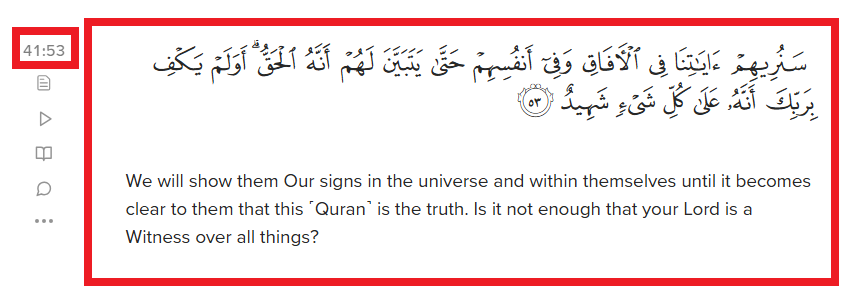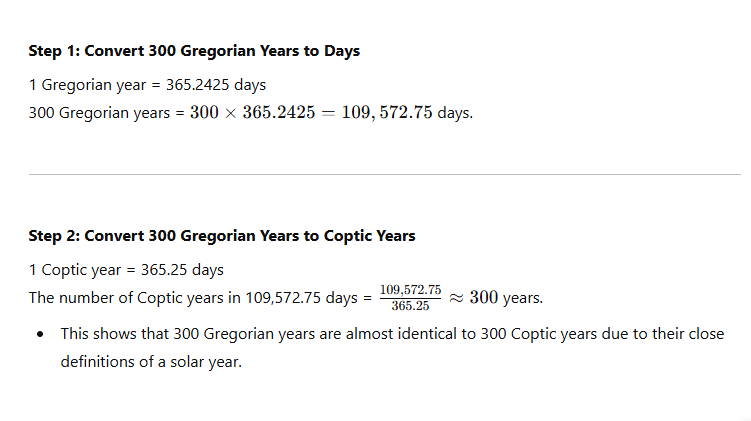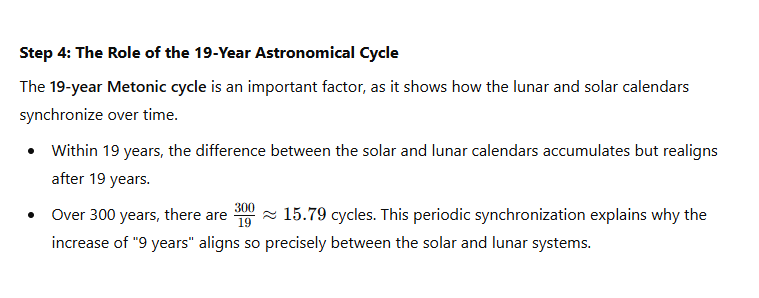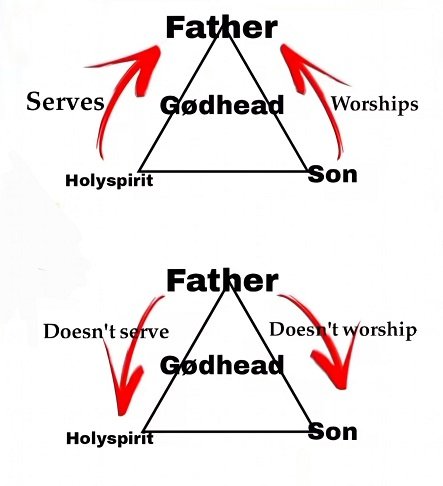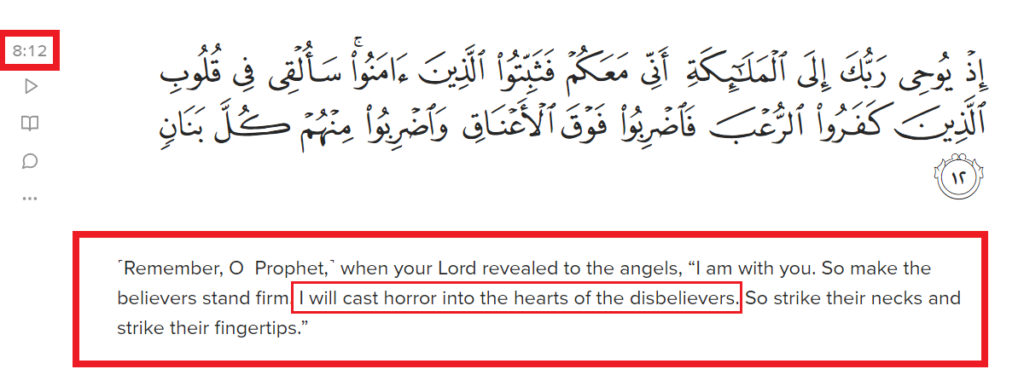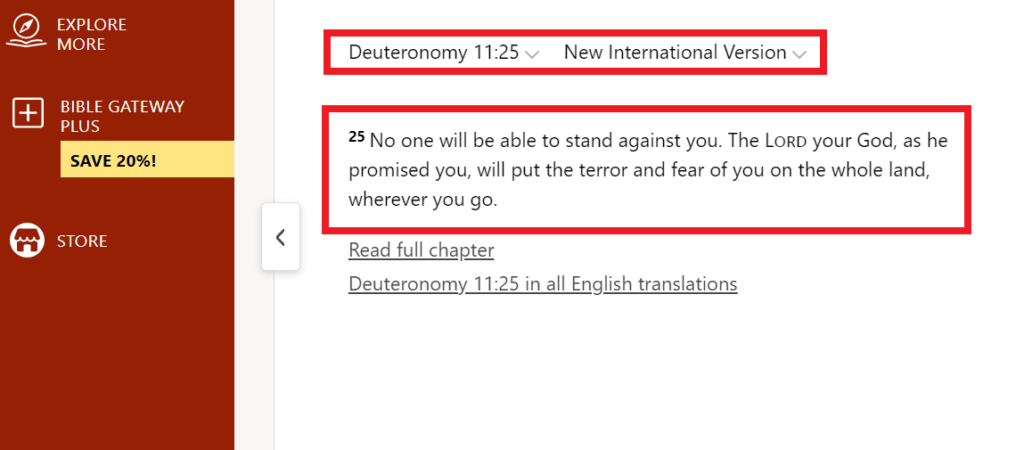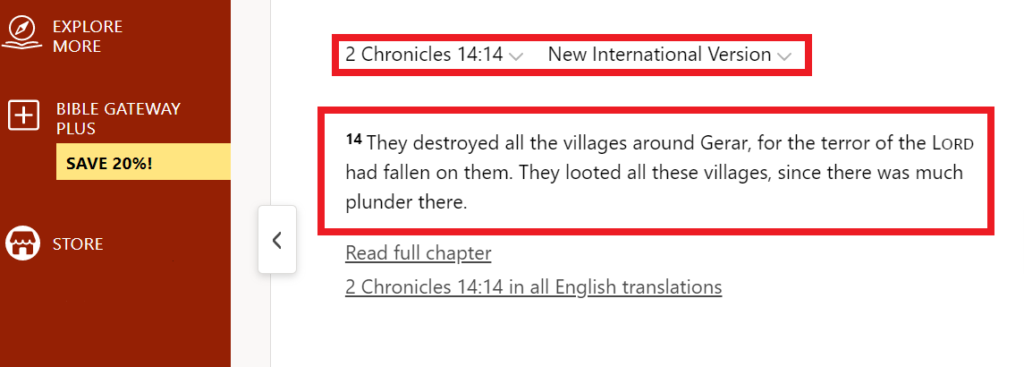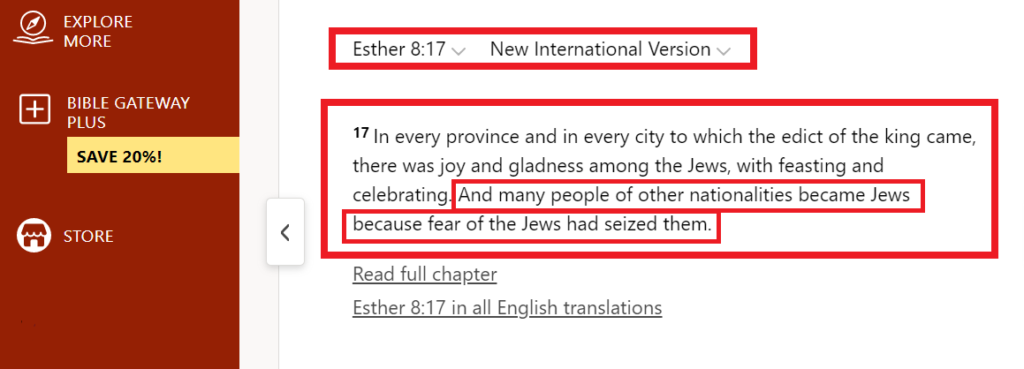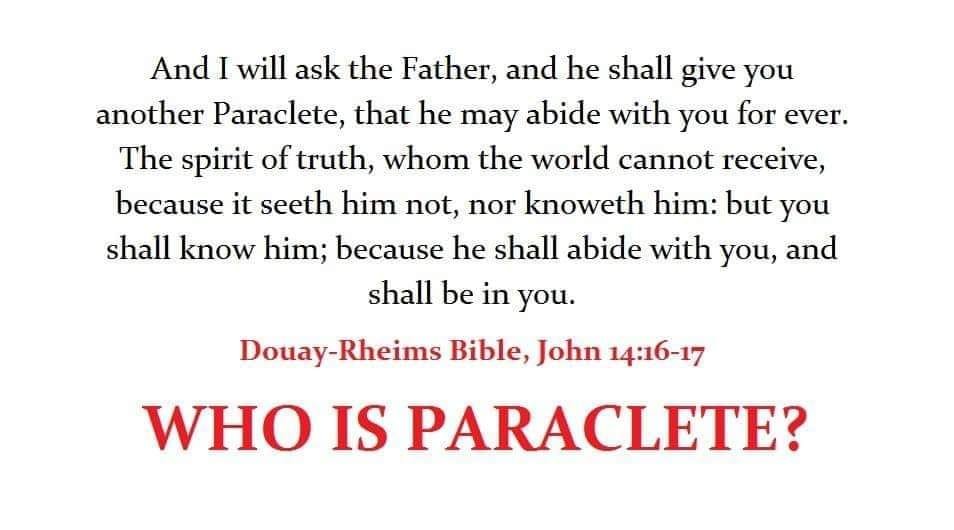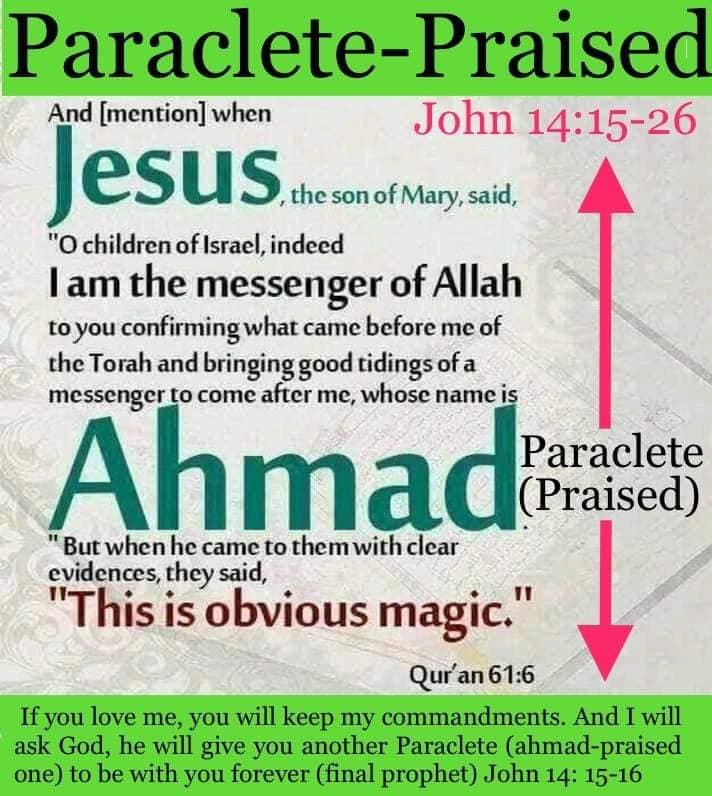𝐂𝐚𝐧 𝐚𝐧𝐲𝐨𝐧𝐞 𝐡𝐞𝐥𝐩 𝐦𝐞 𝐮𝐧𝐝𝐞𝐫𝐬𝐭𝐚𝐧𝐝 𝐭𝐡𝐢𝐬 𝐯𝐞𝐫𝐬𝐞 𝐆𝐨𝐬𝐩𝐞𝐥 𝐨𝐟 𝐉𝐨𝐡𝐧 𝐜𝐡𝐚𝐩𝐭𝐞𝐫 𝟏𝟔 𝐯𝐞𝐫𝐬𝐞 𝟏𝟐-𝟏𝟒?
Mohamad Mostafa Nassar
Twitter:@NassarMohamadMR
𝐓𝐡𝐞 𝐎𝐧𝐥𝐲 𝐌𝐚𝐧 𝐈𝐧 𝐇𝐢𝐬𝐭𝐨𝐫𝐲 𝐓𝐡𝐚𝐭 𝐅𝐢𝐭𝐬 𝐓𝐡𝐞 𝐏𝐫𝐨𝐩𝐡𝐞𝐬𝐲:
𝐓𝐡𝐞𝐫𝐞 𝐢𝐬 𝐚 𝐏𝐫𝐨𝐩𝐡𝐞𝐬𝐲 𝐢𝐧 𝐭𝐡𝐞 𝐛𝐨𝐨𝐤 𝐨𝐟 𝐃𝐞𝐮𝐭𝐞𝐫𝐨𝐧𝐨𝐦𝐲 𝟏𝟖:𝟏𝟖 𝐰𝐡𝐢𝐜𝐡 𝐬𝐭𝐚𝐭𝐞𝐬 𝐭𝐡𝐚𝐭 𝐆𝐨𝐝 𝐰𝐨𝐮𝐥𝐝 𝐫𝐚𝐢𝐬𝐞 𝐮𝐩 𝐚 𝐏𝐫𝐨𝐩𝐡𝐞𝐭 𝐚𝐟𝐭𝐞𝐫 𝐌𝐨𝐬𝐞𝐬, 𝐰𝐡𝐢𝐜𝐡 𝐦𝐚𝐧𝐲 𝐌𝐮𝐬𝐥𝐢𝐦𝐬 𝐚𝐫𝐞 𝐪𝐮𝐢𝐭𝐞 𝐟𝐚𝐦𝐢𝐥𝐢𝐚𝐫 𝐰𝐢𝐭𝐡. 𝐌𝐲 𝐚𝐭𝐭𝐞𝐦𝐩𝐭 𝐰𝐢𝐥𝐥 𝐛𝐞 𝐭𝐨 𝐩𝐫𝐞𝐬𝐞𝐧𝐭 𝐨𝐥𝐝 𝐟𝐚𝐜𝐭𝐬 𝐢𝐧 𝐚 𝐬𝐨𝐦𝐞𝐰𝐡𝐚𝐭 𝐧𝐞𝐰 𝐥𝐢𝐠𝐡𝐭, 𝐬𝐨 𝐛𝐞𝐚𝐫 𝐰𝐢𝐭𝐡 𝐦𝐞. 𝐈𝐧 𝐭𝐡𝐢𝐬 𝐯𝐞𝐫𝐬𝐞, 𝐆𝐨𝐝 𝐭𝐞𝐥𝐥𝐬 𝐌𝐨𝐬𝐞𝐬 𝐭𝐨 𝐭𝐞𝐥𝐥 𝐭𝐡𝐞 𝐈𝐬𝐫𝐚𝐞𝐥𝐢𝐭𝐞𝐬 𝐭𝐡𝐞 𝐟𝐨𝐥𝐥𝐨𝐰𝐢𝐧𝐠: “𝐈 𝐰𝐢𝐥𝐥 𝐫𝐚𝐢𝐬𝐞 𝐮𝐩 𝐟𝐨𝐫 𝐭𝐡𝐞𝐦 𝐚 𝐩𝐫𝐨𝐩𝐡𝐞𝐭 𝐥𝐢𝐤𝐞 𝐲𝐨𝐮 𝐟𝐫𝐨𝐦 𝐚𝐦𝐨𝐧𝐠 𝐭𝐡𝐞𝐢𝐫 (𝐓𝐡𝐞 𝐈𝐬𝐫𝐚𝐞𝐥𝐢𝐭𝐞𝐬) 𝐛𝐫𝐨𝐭𝐡𝐞𝐫𝐬; 𝐈 𝐰𝐢𝐥𝐥 𝐩𝐮𝐭 𝐦𝐲 𝐰𝐨𝐫𝐝𝐬 𝐢𝐧 𝐡𝐢𝐬 𝐦𝐨𝐮𝐭𝐡, 𝐚𝐧𝐝 𝐡𝐞 𝐰𝐢𝐥𝐥 𝐭𝐞𝐥𝐥 𝐭𝐡𝐞𝐦 𝐞𝐯𝐞𝐫𝐲𝐭𝐡𝐢𝐧𝐠 𝐈 𝐜𝐨𝐦𝐦𝐚𝐧𝐝 𝐡𝐢𝐦.”
𝐀 𝐏𝐫𝐨𝐩𝐡𝐞𝐭, 𝐥𝐢𝐤𝐞 𝐌𝐨𝐬𝐞𝐬, 𝐟𝐫𝐨𝐦 𝐚𝐦𝐨𝐧𝐠 𝐭𝐡𝐞 𝐛𝐫𝐨𝐭𝐡𝐞𝐫𝐬 𝐨𝐟 𝐭𝐡𝐞 𝐈𝐬𝐫𝐚𝐞𝐥𝐢𝐭𝐞𝐬. 𝐖𝐡𝐨 𝐚𝐫𝐞 𝐭𝐡𝐞 𝐛𝐫𝐨𝐭𝐡𝐞𝐫𝐬 𝐨𝐟 𝐭𝐡𝐞 𝐈𝐬𝐫𝐚𝐞𝐥𝐢𝐭𝐞𝐬? 𝐈𝐬𝐫𝐚𝐞𝐥𝐢𝐭𝐞𝐬 𝐚𝐫𝐞 𝐝𝐞𝐬𝐜𝐞𝐧𝐝𝐚𝐧𝐭𝐬 𝐨𝐟 𝐈𝐬𝐚𝐚𝐜, 𝐀𝐛𝐫𝐚𝐡𝐚𝐦’𝐬 𝟐𝐧𝐝 𝐬𝐨𝐧, 𝐰𝐡𝐞𝐫𝐞𝐚𝐬 𝐭𝐡𝐞 𝐀𝐫𝐚𝐛𝐬, 𝐨𝐫 𝐈𝐬𝐡𝐦𝐚𝐞𝐥𝐢𝐭𝐞𝐬 𝐚𝐫𝐞 𝐝𝐞𝐬𝐜𝐞𝐧𝐝𝐚𝐧𝐭𝐬 𝐨𝐟 𝐀𝐛𝐫𝐚𝐡𝐚𝐦’𝐬 𝟏𝐬𝐭 𝐬𝐨𝐧, 𝐈𝐬𝐡𝐦𝐚𝐞𝐥. (𝐓𝐡𝐢𝐬 𝐢𝐬 𝐧𝐨𝐭 𝐨𝐧𝐥𝐲 𝐚𝐜𝐜𝐨𝐫𝐝𝐢𝐧𝐠 𝐭𝐨 𝐌𝐮𝐬𝐥𝐢𝐦 𝐡𝐢𝐬𝐭𝐨𝐫𝐲, 𝐛𝐮𝐭 𝐭𝐡𝐞 𝐁𝐢𝐛𝐥𝐞 𝐚𝐬 𝐰𝐞𝐥𝐥, 𝐚𝐧𝐝 𝐢𝐟 𝐲𝐨𝐮 𝐰𝐚𝐧𝐭 𝐩𝐫𝐨𝐨𝐟 𝐨𝐟 𝐭𝐡𝐢𝐬 𝐣𝐮𝐬𝐭 𝐦𝐞𝐬𝐬𝐚𝐠𝐞 𝐦𝐞 𝐚𝐧𝐝 𝐚𝐬𝐤.)
𝐓𝐡𝐞 𝐪𝐮𝐞𝐬𝐭𝐢𝐨𝐧 𝐧𝐞𝐞𝐝 𝐧𝐨𝐭 𝐛𝐞 𝐚𝐬𝐤𝐞𝐝, 𝐛𝐮𝐭 𝐈 𝐬𝐡𝐚𝐥𝐥 𝐚𝐬𝐤 𝐢𝐭 𝐚𝐧𝐲𝐰𝐚𝐲𝐬. 𝐖𝐚𝐬 𝐌𝐮𝐡𝐚𝐦𝐦𝐚𝐝 𝐚𝐧 𝐀𝐫𝐚𝐛, 𝐚 𝐝𝐞𝐬𝐜𝐞𝐧𝐝𝐚𝐧𝐭 𝐨𝐟 𝐈𝐬𝐡𝐦𝐚𝐞𝐥? 𝐌𝐨𝐬𝐭 𝐜𝐞𝐫𝐭𝐚𝐢𝐧𝐥𝐲 𝐡𝐞 𝐰𝐚𝐬, 𝐚𝐧𝐝 𝐢𝐧 𝐟𝐚𝐜𝐭, 𝐌𝐮𝐬𝐥𝐢𝐦𝐬 𝐜𝐚𝐧 𝐞𝐯𝐞𝐧 𝐭𝐫𝐚𝐜𝐞 𝐡𝐢𝐬 𝐥𝐢𝐧𝐞𝐚𝐠𝐞 𝐭𝐨 𝐈𝐬𝐡𝐦𝐚𝐞𝐥.
𝐒𝐨 𝐭𝐡𝐞 𝐧𝐞𝐱𝐭 𝐪𝐮𝐞𝐬𝐭𝐢𝐨𝐧 𝐢𝐬, 𝐢𝐬 𝐌𝐮𝐡𝐚𝐦𝐦𝐚𝐝 (𝐬𝐚𝐚𝐬) 𝐥𝐢𝐤𝐞 𝐌𝐨𝐬𝐞𝐬? 𝐀𝐟𝐭𝐞𝐫 𝐚𝐥𝐥, 𝐭𝐡𝐞 𝐯𝐞𝐫𝐬𝐞 𝐬𝐚𝐲𝐬, “…𝐚 𝐩𝐫𝐨𝐩𝐡𝐞𝐭 𝐥𝐢𝐤𝐞 𝐲𝐨𝐮 (𝐌𝐨𝐬𝐞𝐬)” 𝐖𝐞𝐥𝐥, 𝐥𝐞𝐭 𝐮𝐬 𝐜𝐨𝐧𝐬𝐮𝐥𝐭 𝐚 𝐂𝐡𝐫𝐢𝐬𝐭𝐢𝐚𝐧 𝐒𝐜𝐡𝐨𝐥𝐚𝐫, 𝐥𝐞𝐭 𝐮𝐬 𝐚𝐬𝐤 𝐡𝐢𝐦 𝐢𝐟 𝐌𝐮𝐡𝐚𝐦𝐦𝐚𝐝 𝐢𝐬 𝐥𝐢𝐤𝐞 𝐌𝐨𝐬𝐞𝐬.
𝐈𝐟 𝐰𝐞 𝐫𝐞𝐚𝐝 𝐭𝐡𝐞 𝐛𝐨𝐨𝐤 “𝐃𝐢𝐜𝐭𝐢𝐨𝐧𝐚𝐫𝐲 𝐨𝐟 𝐭𝐡𝐞 𝐁𝐢𝐛𝐥𝐞” 𝐛𝐲 𝐑𝐞𝐯𝐞𝐫𝐞𝐧𝐝 𝐉𝐚𝐦𝐞𝐬 𝐃𝐨𝐰, 𝐮𝐧𝐝𝐞𝐫 𝐭𝐡𝐞 𝐡𝐞𝐚𝐝𝐢𝐧𝐠 “𝐌𝐨𝐬𝐞𝐬” 𝐰𝐞 𝐫𝐞𝐚𝐝 𝐭𝐡𝐞 𝐟𝐨𝐥𝐥𝐨𝐰𝐢𝐧𝐠:
“𝐀𝐬 𝐚 𝐬𝐭𝐚𝐭𝐞𝐬𝐦𝐚𝐧 𝐚𝐧𝐝 𝐚 𝐥𝐚𝐰𝐠𝐢𝐯𝐞𝐫 𝐌𝐨𝐬𝐞𝐬 𝐢𝐬 𝐭𝐡𝐞 𝐜𝐫𝐞𝐚𝐭𝐨𝐫 𝐨𝐟 𝐭𝐡𝐞 𝐉𝐞𝐰𝐢𝐬𝐡 𝐩𝐞𝐨𝐩𝐥𝐞. 𝐇𝐞 𝐟𝐨𝐮𝐧𝐝 𝐚 𝐥𝐨𝐨𝐬𝐞 𝐜𝐨𝐧𝐠𝐥𝐨𝐦𝐞𝐫𝐚𝐭𝐢𝐨𝐧 𝐨𝐟 𝐒𝐞𝐦𝐢𝐭𝐢𝐜 𝐩𝐞𝐨𝐩𝐥𝐞, 𝐧𝐨𝐧𝐞 𝐨𝐟 𝐰𝐡𝐨𝐦 𝐡𝐚𝐝 𝐛𝐞𝐞𝐧 𝐚𝐧𝐲𝐭𝐡𝐢𝐧𝐠 𝐛𝐮𝐭 𝐚 𝐬𝐥𝐚𝐯𝐞, 𝐚𝐧𝐝 𝐰𝐡𝐨𝐬𝐞 𝐢𝐝𝐞𝐚𝐬 𝐨𝐟 𝐫𝐞𝐥𝐢𝐠𝐢𝐨𝐧 𝐰𝐞𝐫𝐞 𝐚 𝐜𝐨𝐦𝐩𝐥𝐞𝐭𝐞 𝐜𝐨𝐧𝐟𝐮𝐬𝐢𝐨𝐧. 𝐇𝐞 𝐥𝐞𝐝 𝐭𝐡𝐞𝐦 𝐨𝐮𝐭 𝐚𝐧𝐝 𝐡𝐞 𝐡𝐚𝐦𝐦𝐞𝐫𝐞𝐝 𝐭𝐡𝐞𝐦 𝐢𝐧𝐭𝐨 𝐚 𝐧𝐚𝐭𝐢𝐨𝐧.
𝐰𝐢𝐭𝐡 𝐚 𝐥𝐚𝐰 𝐚𝐧𝐝 𝐚 𝐧𝐚𝐭𝐢𝐨𝐧𝐚𝐥 𝐩𝐫𝐢𝐝𝐞, 𝐚𝐧𝐝 𝐚 𝐜𝐨𝐦𝐩𝐞𝐥𝐥𝐢𝐧𝐠 𝐬𝐞𝐧𝐬𝐞 𝐨𝐟 𝐛𝐞𝐢𝐧𝐠 𝐜𝐡𝐨𝐬𝐞𝐧 𝐛𝐲 𝐚 𝐩𝐚𝐫𝐭𝐢𝐜𝐮𝐥𝐚𝐫 𝐆𝐨𝐝 𝐰𝐡𝐨 𝐰𝐚𝐬 𝐬𝐮𝐩𝐫𝐞𝐦𝐞. 𝐓𝐡𝐞 𝐨𝐧𝐥𝐲 𝐦𝐚𝐧 𝐢𝐧 𝐡𝐢𝐬𝐭𝐨𝐫𝐲 𝐰𝐡𝐨 𝐜𝐚𝐧 𝐛𝐞 𝐜𝐨𝐦𝐩𝐚𝐫𝐞𝐝 𝐞𝐯𝐞𝐧 𝐫𝐞𝐦𝐨𝐭𝐞𝐥𝐲 𝐭𝐨 𝐡𝐢𝐦 𝐢𝐬 𝐌𝐨𝐡𝐚𝐦𝐞𝐭. 𝐓𝐡𝐞 𝐬𝐜𝐫𝐢𝐩𝐭𝐮𝐫𝐞 𝐚𝐜𝐜𝐨𝐮𝐧𝐭 𝐭𝐞𝐧𝐝𝐬 𝐭𝐨 𝐞𝐥𝐚𝐛𝐨𝐫𝐚𝐭𝐞 𝐟𝐨𝐫 𝐭𝐡𝐞 𝐬𝐚𝐤𝐞 𝐨𝐟 𝐢𝐦𝐩𝐫𝐞𝐬𝐬𝐢𝐨𝐧, 𝐛𝐮𝐭 𝐛𝐞𝐡𝐢𝐧𝐝 𝐚𝐥𝐥 𝐭𝐡𝐞 𝐞𝐥𝐚𝐛𝐨𝐫𝐚𝐭𝐢𝐨𝐧𝐬 𝐬𝐭𝐚𝐧𝐝𝐬 𝐚 𝐦𝐚𝐧 𝐨𝐟 𝐭𝐫𝐞𝐦𝐞𝐧𝐝𝐨𝐮𝐬 𝐰𝐨𝐫𝐭𝐡 𝐚𝐧𝐝 𝐚𝐜𝐡𝐢𝐞𝐯𝐞𝐦𝐞𝐧𝐭, 𝐰𝐡𝐨𝐬𝐞 𝐦𝐚𝐫𝐤 𝐮𝐩𝐨𝐧 𝐭𝐡𝐞 𝐥𝐢𝐟𝐞 𝐨𝐟 𝐭𝐡𝐞 𝐰𝐨𝐫𝐥𝐝 𝐢𝐬 𝐚𝐬 𝐢𝐦𝐩𝐨𝐫𝐭𝐚𝐧𝐭 𝐚𝐬 𝐢𝐭 𝐢𝐬 𝐢𝐧𝐜𝐚𝐥𝐜𝐮𝐥𝐚𝐛𝐥𝐞.” -𝐌𝐨𝐬𝐞𝐬, 𝐩𝐩. 𝟒𝟎𝟐-𝟒𝟎𝟑.
𝐖𝐡𝐨 𝐬𝐚𝐢𝐝 𝐭𝐡𝐚𝐭? 𝐃𝐢𝐝 𝐭𝐡𝐞 𝐌𝐮𝐬𝐥𝐢𝐦 𝐬𝐚𝐲 𝐭𝐡𝐚𝐭? 𝐃𝐢𝐝 𝐭𝐡𝐞 𝐌𝐮𝐬𝐥𝐢𝐦𝐬 𝐭𝐡𝐫𝐞𝐚𝐭𝐞𝐧 𝐭𝐡𝐢𝐬 𝐦𝐚𝐧? 𝐃𝐢𝐝 𝐭𝐡𝐞𝐲 𝐬𝐚𝐲, “𝐋𝐨𝐨𝐤, 𝐩𝐮𝐭 𝐭𝐡𝐢𝐬 𝐢𝐧 𝐲𝐨𝐮𝐫 𝐝𝐢𝐜𝐭𝐢𝐨𝐧𝐚𝐫𝐲 𝐨𝐟 𝐭𝐡𝐞 𝐁𝐢𝐛𝐥𝐞 𝐨𝐫 𝐞𝐥𝐬𝐞 𝐧𝐨 𝐨𝐢𝐥!” -𝐃𝐢𝐝 𝐭𝐡𝐞𝐲? 𝐍𝐨. 𝐉𝐚𝐦𝐞𝐬 𝐃𝐨𝐰, 𝐚 𝐬𝐭𝐮𝐝𝐢𝐞𝐝 𝐑𝐞𝐯𝐞𝐫𝐞𝐧𝐝 𝐬𝐚𝐢𝐝 𝐢𝐭, 𝐛𝐚𝐬𝐞𝐝 𝐨𝐧 𝐡𝐢𝐬 𝐨𝐰𝐧 𝐫𝐚𝐭𝐢𝐨𝐧𝐚𝐥 𝐢𝐧 𝐝𝐞𝐩𝐭𝐡 𝐬𝐭𝐮𝐝𝐲 𝐨𝐟 𝐭𝐡𝐞𝐨𝐥𝐨𝐠𝐲, 𝐭𝐡𝐚𝐭 𝐧𝐨 𝐦𝐚𝐧 𝐢𝐧 𝐡𝐢𝐬𝐭𝐨𝐫𝐲 𝐜𝐚𝐧 𝐛𝐞 𝐜𝐨𝐦𝐩𝐚𝐫𝐞𝐝 𝐭𝐨 𝐌𝐨𝐬𝐞𝐬, 𝐞𝐱𝐜𝐞𝐩𝐭 𝐭𝐡𝐞 𝐏𝐫𝐨𝐩𝐡𝐞𝐭 𝐌𝐮𝐡𝐚𝐦𝐦𝐚𝐝 (𝐬𝐚𝐚𝐬). 𝐍𝐨 𝐦𝐚𝐧 𝐢𝐧 𝐡𝐢𝐬𝐭𝐨𝐫𝐲 𝐢𝐬 𝐥𝐢𝐤𝐞 𝐭𝐡𝐞 𝐏𝐫𝐨𝐩𝐡𝐞𝐭 𝐌𝐨𝐬𝐞𝐬 𝐞𝐱𝐜𝐞𝐩𝐭 𝐨𝐧𝐞 𝐦𝐚𝐧…𝐭𝐡𝐞 𝐏𝐫𝐨𝐩𝐡𝐞𝐭 𝐌𝐮𝐡𝐚𝐦𝐦𝐚𝐝 (𝐬𝐚𝐚𝐬).
𝐓𝐡𝐞 𝐉𝐞𝐰𝐬 𝐒𝐭𝐢𝐥𝐥 𝐖𝐚𝐢𝐭𝐢𝐧𝐠 𝐀𝐫𝐨𝐮𝐧𝐝
𝐃𝐢𝐝 𝐭𝐡𝐞 𝐉𝐞𝐰𝐬 𝐭𝐡𝐢𝐧𝐤 𝐭𝐡𝐢𝐬 𝐏𝐫𝐨𝐩𝐡𝐞𝐬𝐲 𝐰𝐚𝐬 𝐟𝐮𝐥𝐟𝐢𝐥𝐥𝐞𝐝 𝐚𝐭 𝐚𝐧𝐲 𝐩𝐨𝐢𝐧𝐭? 𝐎𝐫 𝐚𝐫𝐞 𝐭𝐡𝐞 𝐉𝐞𝐰𝐬 𝐬𝐭𝐢𝐥𝐥 𝐬𝐢𝐭𝐭𝐢𝐧𝐠 𝐚𝐫𝐨𝐮𝐧𝐝 𝐰𝐚𝐢𝐭𝐢𝐧𝐠 𝐟𝐨𝐫 𝐭𝐡𝐢𝐬? 𝐖𝐞𝐥𝐥, 𝐢𝐟 𝐰𝐞 𝐫𝐞𝐚𝐝 𝐭𝐡𝐞 𝐆𝐨𝐬𝐩𝐞𝐥 𝐨𝐟 𝐉𝐨𝐡𝐧, 𝐜𝐡𝐚𝐩𝐭𝐞𝐫 𝟏, 𝐯𝐞𝐫𝐬𝐞𝐬 𝟏𝟗-𝟐𝟏, 𝐰𝐞 𝐬𝐞𝐞 𝐚 𝐯𝐞𝐫𝐲 𝐢𝐧𝐭𝐞𝐫𝐞𝐬𝐭𝐢𝐧𝐠 𝐜𝐨𝐧𝐯𝐞𝐫𝐬𝐚𝐭𝐢𝐨𝐧 𝐭𝐡𝐚𝐭 𝐭𝐚𝐤𝐞𝐬 𝐩𝐥𝐚𝐜𝐞 𝐛𝐞𝐭𝐰𝐞𝐞𝐧 𝐭𝐡𝐞 𝐉𝐞𝐰𝐬 𝐨𝐟 𝐉𝐞𝐬𝐮𝐬’ (𝐬𝐚𝐚𝐬) 𝐭𝐢𝐦𝐞, 𝐚𝐧𝐝 𝐉𝐨𝐡𝐧 𝐭𝐡𝐞 𝐁𝐚𝐩𝐭𝐢𝐬𝐭. 𝐓𝐡𝐞 𝐬𝐭𝐨𝐫𝐲 𝐢𝐬 𝐟𝐨𝐮𝐧𝐝 𝐢𝐧 𝐭𝐡𝐞 𝐁𝐢𝐛𝐥𝐞 𝐚𝐬 𝐟𝐨𝐥𝐥𝐨𝐰𝐬:
“𝐍𝐨𝐰 𝐭𝐡𝐢𝐬 𝐰𝐚𝐬 𝐉𝐨𝐡𝐧’𝐬 𝐭𝐞𝐬𝐭𝐢𝐦𝐨𝐧𝐲 𝐰𝐡𝐞𝐧 𝐭𝐡𝐞 𝐉𝐞𝐰𝐬 𝐨𝐟 𝐉𝐞𝐫𝐮𝐬𝐚𝐥𝐞𝐦 𝐬𝐞𝐧𝐭 𝐩𝐫𝐢𝐞𝐬𝐭𝐬 𝐚𝐧𝐝 𝐋𝐞𝐯𝐢𝐭𝐞𝐬 𝐭𝐨 𝐚𝐬𝐤 𝐡𝐢𝐦 𝐰𝐡𝐨 𝐡𝐞 𝐰𝐚𝐬. 𝐇𝐞 𝐝𝐢𝐝 𝐧𝐨𝐭 𝐟𝐚𝐢𝐥 𝐭𝐨 𝐜𝐨𝐧𝐟𝐞𝐬𝐬, 𝐛𝐮𝐭 𝐜𝐨𝐧𝐟𝐞𝐬𝐬𝐞𝐝 𝐟𝐫𝐞𝐞𝐥𝐲, ‘𝐈 𝐚𝐦 𝐧𝐨𝐭 𝐭𝐡𝐞 𝐂𝐡𝐫𝐢𝐬𝐭.’ 𝐓𝐡𝐞𝐲 𝐚𝐬𝐤𝐞𝐝 𝐡𝐢𝐦, “𝐓𝐡𝐞𝐧 𝐰𝐡𝐨 𝐚𝐫𝐞 𝐲𝐨𝐮? 𝐀𝐫𝐞 𝐲𝐨𝐮 𝐄𝐥𝐢𝐣𝐚𝐡?” 𝐇𝐞 𝐬𝐚𝐢𝐝, “𝐈 𝐚𝐦 𝐧𝐨𝐭.” “𝐀𝐫𝐞 𝐲𝐨𝐮 𝐭𝐡𝐞 𝐏𝐫𝐨𝐩𝐡𝐞𝐭?” 𝐇𝐞 𝐚𝐧𝐬𝐰𝐞𝐫𝐞𝐝, “𝐍𝐨.”
𝐖𝐞 𝐬𝐞𝐞 𝐭𝐡𝐞 𝐉𝐞𝐰𝐬 𝐰𝐞𝐫𝐞 𝐰𝐚𝐢𝐭𝐢𝐧𝐠 𝐨𝐧 𝟑 𝐃𝐈𝐒𝐓𝐈𝐍𝐂𝐓 𝐏𝐄𝐎𝐏𝐋𝐄. 𝟏. 𝐓𝐡𝐞 𝐌𝐞𝐬𝐬𝐢𝐚𝐡, 𝟐. 𝐄𝐥𝐢𝐣𝐚𝐡, 𝐚𝐧𝐝 𝟑. 𝐓𝐡𝐞 𝐏𝐫𝐨𝐩𝐡𝐞𝐭. 𝐈𝐭 𝐛𝐞𝐜𝐨𝐦𝐞𝐬 𝐞𝐯𝐞𝐧 𝐌𝐎𝐑𝐄 𝐜𝐥𝐞𝐚𝐫 𝐢𝐧 𝐯𝐞𝐫𝐬𝐞𝐬 𝟐𝟒 𝐚𝐧𝐝 𝟐𝟓: “𝐍𝐨𝐰 𝐬𝐨𝐦𝐞 𝐏𝐡𝐚𝐫𝐢𝐬𝐞𝐞𝐬 𝐰𝐡𝐨 𝐡𝐚𝐝 𝐛𝐞𝐞𝐧 𝐬𝐞𝐧𝐭 𝐪𝐮𝐞𝐬𝐭𝐢𝐨𝐧𝐞𝐝 𝐡𝐢𝐦, “𝐖𝐡𝐲 𝐭𝐡𝐞𝐧 𝐝𝐨 𝐲𝐨𝐮 𝐛𝐚𝐩𝐭𝐢𝐳𝐞 𝐢𝐟 𝐲𝐨𝐮 𝐚𝐫𝐞 𝐧𝐨𝐭 (𝟏)𝐭𝐡𝐞 𝐂𝐡𝐫𝐢𝐬𝐭, (𝟐)𝐧𝐨𝐫 𝐄𝐥𝐢𝐣𝐚𝐡, (𝟑)𝐧𝐨𝐫 𝐭𝐡𝐞 𝐏𝐫𝐨𝐩𝐡𝐞𝐭?” (𝐍𝐮𝐦𝐛𝐞𝐫𝐬 𝐚𝐝𝐝𝐞𝐝 𝐛𝐲 𝐦𝐞.)
𝐓𝐡𝐞 𝐉𝐞𝐰𝐬 𝐚𝐫𝐞 𝐬𝐭𝐢𝐥𝐥 𝐰𝐚𝐢𝐭𝐢𝐧𝐠 𝐚𝐫𝐨𝐮𝐧𝐝 𝐟𝐨𝐫 “𝐓𝐡𝐞 𝐏𝐫𝐨𝐩𝐡𝐞𝐭” 𝐢𝐧 𝐀𝐃𝐃𝐈𝐓𝐈𝐎𝐍 𝐓𝐎 𝐄𝐥𝐢𝐣𝐚𝐡, 𝐚𝐧𝐝 𝐭𝐡𝐞 𝐌𝐞𝐬𝐬𝐢𝐚𝐡 (𝐉𝐞𝐬𝐮𝐬).
𝐍𝐨𝐰, 𝐥𝐞𝐭 𝐮𝐬 𝐦𝐨𝐯𝐞 𝐨𝐧 𝐭𝐨 𝐭𝐡𝐞 𝐒𝐌𝐎𝐊𝐈𝐍𝐆 𝐆𝐔𝐍, 𝐚𝐬 𝐢𝐭 𝐢𝐬 𝐜𝐚𝐥𝐥𝐞𝐝. 𝐓𝐡𝐞 𝐫𝐞𝐚𝐥 𝐞𝐯𝐢𝐝𝐞𝐧𝐜𝐞. 𝐓𝐡𝐞 𝐯𝐞𝐫𝐲 𝐰𝐨𝐫𝐝𝐬 𝐨𝐟 𝐉𝐞𝐬𝐮𝐬 𝐂𝐡𝐫𝐢𝐬𝐭 𝐡𝐢𝐦𝐬𝐞𝐥𝐟.
𝐉𝐞𝐬𝐮𝐬 𝐃𝐞𝐬𝐜𝐫𝐢𝐛𝐞𝐬 𝐖𝐡𝐨 𝐖𝐚𝐬 𝐓𝐨 𝐂𝐨𝐦𝐞 𝐀𝐟𝐭𝐞𝐫 𝐇𝐢𝐦
𝐖𝐞 𝐫𝐞𝐚𝐝 𝐟𝐫𝐨𝐦 𝐭𝐡𝐞 𝐥𝐢𝐩𝐬 𝐨𝐟 𝐉𝐞𝐬𝐮𝐬 (𝐬𝐚𝐚𝐬), 𝐢𝐧 𝐭𝐡𝐞 𝐆𝐨𝐬𝐩𝐞𝐥 𝐨𝐟 𝐉𝐨𝐡𝐧, 𝐚𝐬 𝐡𝐞 𝐢𝐬 𝐬𝐩𝐞𝐚𝐤𝐢𝐧𝐠 𝐭𝐨 𝐡𝐢𝐬 𝐝𝐢𝐬𝐜𝐢𝐩𝐥𝐞𝐬, 𝐭𝐡𝐞 𝐟𝐨𝐥𝐥𝐨𝐰𝐢𝐧𝐠 𝐩𝐫𝐨𝐩𝐡𝐞𝐬𝐲: “𝐀𝐧𝐝 𝐈 𝐰𝐢𝐥𝐥 𝐚𝐬𝐤 𝐭𝐡𝐞 𝐅𝐚𝐭𝐡𝐞𝐫, 𝐚𝐧𝐝 𝐡𝐞 𝐰𝐢𝐥𝐥 𝐠𝐢𝐯𝐞 𝐲𝐨𝐮 𝐚𝐧𝐨𝐭𝐡𝐞𝐫 𝐂𝐨𝐮𝐧𝐬𝐞𝐥𝐨𝐫 𝐭𝐨 𝐛𝐞 𝐰𝐢𝐭𝐡 𝐲𝐨𝐮 𝐟𝐨𝐫𝐞𝐯𝐞𝐫— 𝐭𝐡𝐞 𝐒𝐩𝐢𝐫𝐢𝐭 𝐨𝐟 𝐭𝐫𝐮𝐭𝐡. 𝐓𝐡𝐞 𝐰𝐨𝐫𝐥𝐝 𝐜𝐚𝐧𝐧𝐨𝐭 𝐚𝐜𝐜𝐞𝐩𝐭 𝐡𝐢𝐦, 𝐛𝐞𝐜𝐚𝐮𝐬𝐞 𝐢𝐭 𝐧𝐞𝐢𝐭𝐡𝐞𝐫 𝐬𝐞𝐞𝐬 𝐡𝐢𝐦 𝐧𝐨𝐫 𝐤𝐧𝐨𝐰𝐬 𝐡𝐢𝐦.
𝐁𝐮𝐭 𝐲𝐨𝐮 𝐤𝐧𝐨𝐰 𝐡𝐢𝐦, 𝐟𝐨𝐫 𝐡𝐞 𝐥𝐢𝐯𝐞𝐬 𝐰𝐢𝐭𝐡 𝐲𝐨𝐮 𝐚𝐧𝐝 𝐰𝐢𝐥𝐥 𝐛𝐞 𝐢𝐧 𝐲𝐨𝐮.”(𝐉𝐨𝐡𝐧 𝟏𝟒:𝟏𝟔-𝟏𝟕) 𝐉𝐞𝐬𝐮𝐬 (𝐬𝐚𝐚𝐬) 𝐠𝐨𝐞𝐬 𝐨𝐧 𝐭𝐨 𝐬𝐚𝐲: “𝐁𝐮𝐭 𝐭𝐡𝐞 𝐂𝐨𝐮𝐧𝐬𝐞𝐥𝐨𝐫, 𝐭𝐡𝐞 𝐒𝐩𝐢𝐫𝐢𝐭, 𝐰𝐡𝐨𝐦 𝐭𝐡𝐞 𝐅𝐚𝐭𝐡𝐞𝐫 𝐰𝐢𝐥𝐥 𝐬𝐞𝐧𝐝 𝐢𝐧 𝐦𝐲 𝐧𝐚𝐦𝐞, 𝐰𝐢𝐥𝐥 𝐭𝐞𝐚𝐜𝐡 𝐲𝐨𝐮 𝐚𝐥𝐥 𝐭𝐡𝐢𝐧𝐠𝐬 𝐚𝐧𝐝 𝐰𝐢𝐥𝐥 𝐫𝐞𝐦𝐢𝐧𝐝 𝐲𝐨𝐮 𝐨𝐟 𝐞𝐯𝐞𝐫𝐲𝐭𝐡𝐢𝐧𝐠 𝐈 𝐡𝐚𝐯𝐞 𝐬𝐚𝐢𝐝 𝐭𝐨 𝐲𝐨𝐮.” (𝐉𝐨𝐡𝐧 𝟏𝟒:𝟐𝟔), 𝐚𝐧𝐝 𝐟𝐮𝐫𝐭𝐡𝐞𝐫: “𝐁𝐮𝐭 𝐰𝐡𝐞𝐧 𝐭𝐡𝐞 𝐂𝐨𝐦𝐟𝐨𝐫𝐭𝐞𝐫 𝐢𝐬 𝐜𝐨𝐦𝐞, 𝐰𝐡𝐨𝐦 𝐈 𝐰𝐢𝐥𝐥 𝐬𝐞𝐧𝐝 𝐮𝐧𝐭𝐨 𝐲𝐨𝐮 𝐟𝐫𝐨𝐦 𝐭𝐡𝐞 𝐅𝐚𝐭𝐡𝐞𝐫, [𝐞𝐯𝐞𝐧] 𝐭𝐡𝐞 𝐒𝐩𝐢𝐫𝐢𝐭 𝐨𝐟 𝐭𝐫𝐮𝐭𝐡, 𝐰𝐡𝐢𝐜𝐡 𝐩𝐫𝐨𝐜𝐞𝐞𝐝𝐞𝐭𝐡 𝐟𝐫𝐨𝐦 𝐭𝐡𝐞 𝐅𝐚𝐭𝐡𝐞𝐫, 𝐡𝐞 𝐬𝐡𝐚𝐥𝐥 𝐭𝐞𝐬𝐭𝐢𝐟𝐲 𝐨𝐟 𝐦𝐞” (𝐉𝐨𝐡𝐧 𝟏𝟓:𝟐𝟔) 𝐚𝐧𝐝 𝐅𝐮𝐫𝐭𝐡𝐞𝐫:
“𝐍𝐞𝐯𝐞𝐫𝐭𝐡𝐞𝐥𝐞𝐬𝐬 𝐈 𝐭𝐞𝐥𝐥 𝐲𝐨𝐮 𝐭𝐡𝐞 𝐭𝐫𝐮𝐭𝐡; 𝐈𝐭 𝐢𝐬 𝐞𝐱𝐩𝐞𝐝𝐢𝐞𝐧𝐭 𝐟𝐨𝐫 𝐲𝐨𝐮 𝐭𝐡𝐚𝐭 𝐈 𝐠𝐨 𝐚𝐰𝐚𝐲: 𝐟𝐨𝐫 𝐢𝐟 𝐈 𝐠𝐨 𝐧𝐨𝐭 𝐚𝐰𝐚𝐲, 𝐭𝐡𝐞 𝐂𝐨𝐦𝐟𝐨𝐫𝐭𝐞𝐫 𝐰𝐢𝐥𝐥 𝐧𝐨𝐭 𝐜𝐨𝐦𝐞 𝐮𝐧𝐭𝐨 𝐲𝐨𝐮; 𝐛𝐮𝐭 𝐢𝐟 𝐈 𝐝𝐞𝐩𝐚𝐫𝐭, 𝐈 𝐰𝐢𝐥𝐥 𝐬𝐞𝐧𝐝 𝐡𝐢𝐦 𝐮𝐧𝐭𝐨 𝐲𝐨𝐮. 𝐀𝐧𝐝 𝐰𝐡𝐞𝐧 𝐡𝐞 𝐢𝐬 𝐜𝐨𝐦𝐞, 𝐡𝐞 𝐰𝐢𝐥𝐥 𝐫𝐞𝐩𝐫𝐨𝐯𝐞 𝐭𝐡𝐞 𝐰𝐨𝐫𝐥𝐝 𝐨𝐟 𝐬𝐢𝐧, 𝐚𝐧𝐝 𝐨𝐟 𝐫𝐢𝐠𝐡𝐭𝐞𝐨𝐮𝐬𝐧𝐞𝐬𝐬, 𝐚𝐧𝐝 𝐨𝐟 𝐣𝐮𝐝𝐠𝐦𝐞𝐧𝐭: 𝐎𝐟 𝐬𝐢𝐧, 𝐛𝐞𝐜𝐚𝐮𝐬𝐞 𝐭𝐡𝐞𝐲 𝐛𝐞𝐥𝐢𝐞𝐯𝐞 𝐧𝐨𝐭 𝐨𝐧 𝐦𝐞; 𝐎𝐟 𝐫𝐢𝐠𝐡𝐭𝐞𝐨𝐮𝐬𝐧𝐞𝐬𝐬, 𝐛𝐞𝐜𝐚𝐮𝐬𝐞 𝐈 𝐠𝐨 𝐭𝐨 𝐦𝐲 𝐅𝐚𝐭𝐡𝐞𝐫, 𝐚𝐧𝐝 𝐲𝐞 𝐬𝐞𝐞 𝐦𝐞 𝐧𝐨 𝐦𝐨𝐫𝐞; 𝐎𝐟 𝐣𝐮𝐝𝐠𝐦𝐞𝐧𝐭, 𝐛𝐞𝐜𝐚𝐮𝐬𝐞 𝐭𝐡𝐞 𝐩𝐫𝐢𝐧𝐜𝐞 𝐨𝐟 𝐭𝐡𝐢𝐬 𝐰𝐨𝐫𝐥𝐝 𝐢𝐬 𝐣𝐮𝐝𝐠𝐞𝐝. 𝐈 𝐡𝐚𝐯𝐞 𝐲𝐞𝐭 𝐦𝐚𝐧𝐲 𝐭𝐡𝐢𝐧𝐠𝐬 𝐭𝐨 𝐬𝐚𝐲 𝐮𝐧𝐭𝐨 𝐲𝐨𝐮, 𝐛𝐮𝐭 𝐲𝐞 𝐜𝐚𝐧𝐧𝐨𝐭 𝐛𝐞𝐚𝐫 𝐭𝐡𝐞𝐦 𝐧𝐨𝐰.
𝐇𝐨𝐰𝐛𝐞𝐢𝐭 𝐰𝐡𝐞𝐧 𝐡𝐞, 𝐭𝐡𝐞 𝐒𝐩𝐢𝐫𝐢𝐭 𝐨𝐟 𝐭𝐫𝐮𝐭𝐡, 𝐢𝐬 𝐜𝐨𝐦𝐞, 𝐡𝐞 𝐰𝐢𝐥𝐥 𝐠𝐮𝐢𝐝𝐞 𝐲𝐨𝐮 𝐢𝐧𝐭𝐨 𝐚𝐥𝐥 𝐭𝐫𝐮𝐭𝐡: 𝐟𝐨𝐫 𝐡𝐞 𝐬𝐡𝐚𝐥𝐥 𝐧𝐨𝐭 𝐬𝐩𝐞𝐚𝐤 𝐨𝐟 𝐡𝐢𝐦𝐬𝐞𝐥𝐟; 𝐛𝐮𝐭 𝐰𝐡𝐚𝐭𝐬𝐨𝐞𝐯𝐞𝐫 𝐡𝐞 𝐬𝐡𝐚𝐥𝐥 𝐡𝐞𝐚𝐫, [𝐭𝐡𝐚𝐭] 𝐬𝐡𝐚𝐥𝐥 𝐡𝐞 𝐬𝐩𝐞𝐚𝐤: 𝐚𝐧𝐝 𝐡𝐞 𝐰𝐢𝐥𝐥 𝐬𝐡𝐞𝐰 𝐲𝐨𝐮 𝐭𝐡𝐢𝐧𝐠𝐬 𝐭𝐨 𝐜𝐨𝐦𝐞. 𝐇𝐞 𝐬𝐡𝐚𝐥𝐥 𝐠𝐥𝐨𝐫𝐢𝐟𝐲 𝐦𝐞: 𝐟𝐨𝐫 𝐡𝐞 𝐬𝐡𝐚𝐥𝐥 𝐫𝐞𝐜𝐞𝐢𝐯𝐞 𝐨𝐟 𝐦𝐢𝐧𝐞, 𝐚𝐧𝐝 𝐬𝐡𝐚𝐥𝐥 𝐬𝐡𝐞𝐰 [𝐢𝐭] 𝐮𝐧𝐭𝐨 𝐲𝐨𝐮.”(𝐉𝐨𝐡𝐧 𝟏𝟔:𝟕-𝟏𝟒).
𝐍𝐨𝐭𝐢𝐜𝐞 𝐭𝐡𝐚𝐭 𝐢𝐧 𝐯𝐚𝐫𝐢𝐨𝐮𝐬 𝐩𝐥𝐚𝐜𝐞𝐬 𝐭𝐡𝐢𝐬 𝐏𝐫𝐨𝐩𝐡𝐞𝐬𝐲 𝐢𝐬 𝐟𝐨𝐫, 𝐰𝐡𝐚𝐭 𝐢𝐬 𝐫𝐞𝐟𝐞𝐫𝐫𝐞𝐝 𝐭𝐨 𝐞𝐢𝐭𝐡𝐞𝐫 𝐚𝐬 𝐚 “𝐂𝐨𝐦𝐟𝐨𝐫𝐭𝐞𝐫” 𝐨𝐫 𝐚 “𝐂𝐨𝐮𝐧𝐬𝐞𝐥𝐨𝐫.” -𝐁𝐨𝐭𝐡 𝐨𝐟 𝐭𝐡𝐞𝐬𝐞 𝐰𝐨𝐫𝐝𝐬 𝐚𝐫𝐞 𝐭𝐡𝐞 𝐭𝐫𝐚𝐧𝐬𝐥𝐚𝐭𝐢𝐨𝐧𝐬 𝐨𝐟 𝐰𝐡𝐚𝐭 𝐢𝐬 𝐭𝐡𝐞 𝐬𝐚𝐦𝐞 𝐰𝐨𝐫𝐝 𝐢𝐧 𝐭𝐡𝐞 𝐆𝐫𝐞𝐞𝐤 𝐦𝐚𝐧𝐮𝐬𝐜𝐫𝐢𝐩𝐭, 𝐭𝐡𝐞 𝐆𝐫𝐞𝐞𝐤 𝐰𝐨𝐫𝐝 “𝐏𝐚𝐫𝐚𝐜𝐥𝐞𝐭𝐞.”
‘𝐏𝐚𝐫𝐚𝐜𝐥𝐞𝐭𝐞’ = ‘𝐀𝐡𝐦𝐚𝐝’!!!
𝐓𝐡𝐞𝐫𝐞 𝐡𝐚𝐬 𝐛𝐞𝐞𝐧 𝐦𝐮𝐜𝐡 𝐜𝐨𝐧𝐟𝐮𝐬𝐢𝐨𝐧 𝐨𝐯𝐞𝐫 𝐭𝐡𝐞𝐬𝐞 𝐯𝐞𝐫𝐬𝐞𝐬, 𝐚𝐧𝐝 𝐰𝐡𝐨/𝐰𝐡𝐚𝐭 𝐭𝐡𝐞 𝐏𝐚𝐫𝐚𝐜𝐥𝐞𝐭𝐞 𝐢𝐬, 𝐚𝐥𝐭𝐡𝐨𝐮𝐠𝐡 𝐭𝐡𝐞 𝐭𝐫𝐚𝐝𝐢𝐭𝐢𝐨𝐧𝐚𝐥𝐥𝐲 𝐚𝐜𝐜𝐞𝐩𝐭𝐞𝐝 𝐯𝐢𝐞𝐰 𝐭𝐨𝐝𝐚𝐲 𝐢𝐬 𝐭𝐡𝐚𝐭 𝐭𝐡𝐞𝐬𝐞 𝐯𝐞𝐫𝐬𝐞𝐬 𝐫𝐞𝐟𝐞𝐫 𝐭𝐨 𝐭𝐡𝐞 𝐇𝐨𝐥𝐲 𝐒𝐩𝐢𝐫𝐢𝐭. 𝐇𝐨𝐰𝐞𝐯𝐞𝐫 𝐢𝐭 𝐢𝐬 𝐢𝐦𝐩𝐨𝐫𝐭𝐚𝐧𝐭 𝐭𝐨 𝐧𝐨𝐭𝐞, 𝐭𝐡𝐚𝐭 𝐭𝐡𝐢𝐬 𝐯𝐞𝐫𝐬𝐞 𝐢𝐬 𝐫𝐚𝐭𝐡𝐞𝐫 𝐚𝐦𝐛𝐢𝐠𝐮𝐨𝐮𝐬, 𝐚𝐧𝐝 𝐦𝐚𝐧𝐲 𝐂𝐡𝐫𝐢𝐬𝐭𝐢𝐚𝐧 𝐡𝐢𝐬𝐭𝐨𝐫𝐢𝐚𝐧𝐬 𝐦𝐚𝐤𝐞 𝐚𝐧 𝐢𝐧𝐭𝐞𝐫𝐞𝐬𝐭𝐢𝐧𝐠 𝐧𝐨𝐭𝐞.
𝐅𝐫𝐨𝐦 𝐓𝐡𝐞 𝐀𝐧𝐜𝐡𝐨𝐫 𝐁𝐢𝐛𝐥𝐞, 𝐃𝐨𝐮𝐛𝐥𝐞𝐝𝐚𝐲 & 𝐂𝐨𝐦𝐩𝐚𝐧𝐲, 𝐈𝐧𝐜, 𝐕𝐨𝐥𝐮𝐦𝐞 𝟐𝟗𝐀, 𝐩. 𝟏𝟏𝟑𝟓 𝐰𝐞 𝐫𝐞𝐚𝐝 𝐭𝐡𝐞 𝐟𝐨𝐥𝐥𝐨𝐰𝐢𝐧𝐠 𝐕𝐄𝐑𝐘 𝐢𝐧𝐭𝐞𝐫𝐞𝐬𝐭𝐢𝐧𝐠 𝐧𝐨𝐭𝐞: “…𝐬𝐜𝐡𝐨𝐥𝐚𝐫𝐬 𝐥𝐢𝐤𝐞 𝐒𝐩𝐢𝐭𝐭𝐚, 𝐃𝐞𝐥𝐚𝐟𝐨𝐬𝐬𝐞, 𝐖𝐢𝐧𝐝𝐢𝐬𝐜𝐡, 𝐒𝐚𝐬𝐬𝐞, 𝐁𝐮𝐥𝐭𝐦𝐚𝐧𝐧, 𝐚𝐧𝐝 𝐁𝐞𝐭𝐳 𝐡𝐚𝐯𝐞 𝐝𝐨𝐮𝐛𝐭𝐞𝐝 𝐰𝐡𝐞𝐭𝐡𝐞𝐫 𝐭𝐡𝐢𝐬 𝐢𝐝𝐞𝐧𝐭𝐢𝐟𝐢𝐜𝐚𝐭𝐢𝐨𝐧 𝐢𝐬 𝐭𝐫𝐮𝐞 𝐭𝐨 𝐭𝐡𝐞 𝐨𝐫𝐢𝐠𝐢𝐧𝐚𝐥 𝐩𝐢𝐜𝐭𝐮𝐫𝐞 𝐚𝐧𝐝 𝐡𝐚𝐯𝐞 𝐬𝐮𝐠𝐠𝐞𝐬𝐭𝐞𝐝 𝐭𝐡𝐚𝐭 𝐭𝐡𝐞 𝐏𝐚𝐫𝐚𝐜𝐥𝐞𝐭𝐞 𝐰𝐚𝐬 𝐨𝐧𝐜𝐞 𝐚𝐧 𝐢𝐧𝐝𝐞𝐩𝐞𝐧𝐝𝐞𝐧𝐭 𝐬𝐚𝐥𝐯𝐢𝐟𝐢𝐜 𝐟𝐢𝐠𝐮𝐫𝐞, 𝐥𝐚𝐭𝐞𝐫 𝐜𝐨𝐧𝐟𝐮𝐬𝐞𝐝 𝐰𝐢𝐭𝐡 𝐭𝐡𝐞 𝐇𝐨𝐥𝐲 𝐒𝐩𝐢𝐫𝐢𝐭.”
𝐒𝐨 𝐭𝐡𝐢𝐬 𝐠𝐞𝐭𝐬 𝐮𝐬 𝐭𝐡𝐢𝐧𝐤𝐢𝐧𝐠. 𝐀 𝐥𝐨𝐭 𝐨𝐟 𝐞𝐚𝐫𝐥𝐲 𝐂𝐡𝐫𝐢𝐬𝐭𝐢𝐚𝐧𝐬 𝐝𝐢𝐝 𝐍𝐎𝐓 𝐢𝐧𝐭𝐞𝐫𝐩𝐫𝐞𝐭 𝐭𝐡𝐢𝐬 𝐭𝐨 𝐛𝐞 𝐚 𝐒𝐩𝐢𝐫𝐢𝐭. 𝐕𝐞𝐫𝐲 𝐢𝐧𝐭𝐞𝐫𝐞𝐬𝐭𝐢𝐧𝐠! 𝐁𝐮𝐭, 𝐭𝐡𝐞 𝐩𝐥𝐨𝐭 𝐭𝐡𝐢𝐜𝐤𝐞𝐧𝐬! 𝐋𝐞𝐭 𝐮𝐬 𝐭𝐚𝐤𝐞 𝐚𝐧𝐨𝐭𝐡𝐞𝐫 𝐠𝐥𝐚𝐧𝐜𝐞 𝐚𝐭 𝐭𝐡𝐞 𝐰𝐨𝐫𝐝 “𝐏𝐚𝐫𝐚𝐜𝐥𝐞𝐭𝐞.”
𝐏𝐚𝐫𝐚𝐜𝐥𝐞𝐭𝐞 𝐜𝐨𝐦𝐞𝐬 𝐟𝐫𝐨𝐦 𝐭𝐡𝐞 𝐆𝐫𝐞𝐞𝐤 𝐑𝐨𝐨𝐭 𝐰𝐨𝐫𝐝 𝐏𝐚𝐫𝐚𝐤𝐥𝐞𝐭𝐨𝐬. 𝐅𝐫𝐨𝐦 𝐭𝐡𝐢𝐬 𝐬𝐚𝐦𝐞 𝐫𝐨𝐨𝐭 𝐰𝐨𝐫𝐝 𝐜𝐨𝐦𝐞𝐬 𝐢𝐭’𝐬 𝐝𝐞𝐫𝐢𝐯𝐢𝐭𝐢𝐯𝐞, 𝐏𝐞𝐫𝐢𝐤𝐥𝐲𝐭𝐨𝐬, 𝐰𝐡𝐢𝐜𝐡 𝐦𝐞𝐚𝐧𝐬, “𝐏𝐫𝐚𝐢𝐬𝐞𝐝 𝐨𝐧𝐞.” 𝐃𝐨𝐞𝐬 𝐚𝐧𝐲𝐨𝐧𝐞 𝐤𝐧𝐨𝐰 𝐰𝐡𝐚𝐭 𝐭𝐡𝐞 𝐀𝐫𝐚𝐛𝐢𝐜 𝐰𝐨𝐫𝐝 𝐟𝐨𝐫 “𝐏𝐫𝐚𝐢𝐬𝐞𝐝 𝐨𝐧𝐞” 𝐢𝐬? 𝐈𝐟 𝐲𝐨𝐮 𝐠𝐮𝐞𝐬𝐬𝐞𝐝 “𝐌𝐮𝐡𝐚𝐦𝐦𝐚𝐝” 𝐲𝐨𝐮 𝐚𝐫𝐞 𝐫𝐢𝐠𝐡𝐭!
𝐍𝐨𝐰, 𝐬𝐨𝐦𝐞𝐭𝐢𝐦𝐞𝐬 𝐏𝐚𝐫𝐚𝐜𝐥𝐞𝐭𝐞 𝐢𝐬 𝐭𝐫𝐚𝐧𝐬𝐥𝐚𝐭𝐞𝐝 𝐚𝐬 “𝐈𝐧𝐭𝐞𝐫𝐜𝐞𝐬𝐬𝐨𝐫” 𝐨𝐫 “𝐂𝐨𝐧𝐬𝐨𝐥𝐞𝐫.” -𝐭𝐡𝐢𝐬 𝐢𝐬 𝐢𝐧 𝐟𝐚𝐜𝐭 𝐚 𝐦𝐢𝐬𝐮𝐧𝐝𝐞𝐫𝐬𝐭𝐚𝐧𝐝𝐢𝐧𝐠 𝐨𝐟 𝐞𝐚𝐫𝐥𝐲 𝐭𝐫𝐚𝐧𝐬𝐥𝐚𝐭𝐨𝐫𝐬, 𝐛𝐞𝐜𝐚𝐮𝐬𝐞 𝐭𝐡𝐞 𝐆𝐫𝐞𝐞𝐤 𝐰𝐨𝐫𝐝 𝐟𝐨𝐫 𝐢𝐧𝐭𝐞𝐫𝐜𝐞𝐬𝐬𝐨𝐫 𝐢𝐬 𝐏𝐚𝐫𝐚𝐪𝐚𝐥𝐨𝐧, 𝐰𝐡𝐢𝐜𝐡, 𝐚𝐥𝐭𝐡𝐨𝐮𝐠𝐡 𝐬𝐢𝐦𝐢𝐥𝐚𝐫 𝐚𝐧𝐝 𝐟𝐫𝐨𝐦 𝐭𝐡𝐞 𝐬𝐚𝐦𝐞 𝐫𝐨𝐨𝐭, 𝐢𝐬 𝐧𝐨𝐭 𝐭𝐡𝐞 𝐰𝐨𝐫𝐝 𝐮𝐬𝐞𝐝 𝐢𝐧 𝐭𝐡𝐞 𝐆𝐫𝐞𝐞𝐤 𝐭𝐞𝐱𝐭.
𝐖𝐡𝐞𝐧 𝐰𝐞 𝐭𝐚𝐤𝐞 𝐢𝐧𝐭𝐨 𝐚𝐜𝐜𝐨𝐮𝐧𝐭 𝐭𝐡𝐚𝐭 𝐭𝐡𝐞 𝐠𝐨𝐬𝐩𝐞𝐥 𝐰𝐚𝐬 𝐭𝐫𝐚𝐧𝐬𝐥𝐚𝐭𝐞𝐝 𝐟𝐫𝐨𝐦 𝐀𝐫𝐚𝐦𝐚𝐢𝐜 (𝐀 𝐒𝐞𝐦𝐞𝐭𝐢𝐜 𝐥𝐚𝐧𝐠𝐮𝐚𝐠𝐞 𝐬𝐢𝐦𝐢𝐥𝐚𝐫 𝐭𝐨 𝐀𝐫𝐚𝐛𝐢𝐜 𝐚𝐧𝐝 𝐇𝐞𝐛𝐫𝐞𝐰) 𝐈𝐍𝐓𝐎 𝐆𝐫𝐞𝐞𝐤, 𝐰𝐞 𝐬𝐞𝐞 𝐭𝐡𝐚𝐭 𝐢𝐭 𝐢𝐬 𝐧𝐨𝐭 𝐞𝐧𝐭𝐢𝐫𝐞𝐥𝐲 𝐮𝐧𝐛𝐞𝐥𝐢𝐞𝐯𝐚𝐛𝐥𝐞 𝐭𝐡𝐚𝐭 𝐭𝐡𝐢𝐬 𝐢𝐬 𝐪𝐮𝐢𝐭𝐞 𝐥𝐢𝐤𝐞𝐥𝐲 𝐚 𝐩𝐥𝐚𝐜𝐞 𝐰𝐡𝐞𝐫𝐞, 𝐢𝐧 𝐡𝐢𝐬 𝐨𝐫𝐢𝐠𝐢𝐧𝐚𝐥 𝐥𝐚𝐧𝐠𝐮𝐚𝐠𝐞 𝐉𝐞𝐬𝐮𝐬 𝐏𝐫𝐨𝐩𝐡𝐞𝐬𝐢𝐞𝐝 𝐭𝐡𝐞 𝐜𝐨𝐦𝐢𝐧𝐠 𝐨𝐟 𝐌𝐮𝐡𝐚𝐦𝐦𝐚𝐝 (𝐬𝐚𝐚𝐬) 𝐛𝐲 𝐧𝐚𝐦𝐞.
𝐍𝐨𝐰, 𝐈 𝐭𝐡𝐢𝐧𝐤 𝐭𝐡𝐚𝐭 𝐞𝐯𝐞𝐫𝐲 𝐩𝐞𝐫𝐬𝐨𝐧 𝐢𝐧 𝐭𝐡𝐞 𝐖𝐞𝐬𝐭𝐞𝐫𝐧 𝐰𝐨𝐫𝐥𝐝 𝐡𝐚𝐬 𝐩𝐫𝐨𝐛𝐚𝐛𝐥𝐲 𝐰𝐚𝐭𝐜𝐡𝐞𝐝 𝐭𝐡𝐞 𝐏𝐚𝐬𝐬𝐢𝐨𝐧 𝐨𝐟 𝐭𝐡𝐞 𝐂𝐡𝐫𝐢𝐬𝐭, 𝐭𝐡𝐞 𝐌𝐞𝐥 𝐆𝐢𝐛𝐬𝐨𝐧 𝐟𝐢𝐥𝐦. 𝐖𝐞𝐥𝐥, 𝐰𝐡𝐚𝐭𝐬 𝐢𝐧𝐭𝐞𝐫𝐞𝐬𝐭𝐢𝐧𝐠 𝐚𝐛𝐨𝐮𝐭 𝐭𝐡𝐚𝐭 𝐟𝐢𝐥𝐦 𝐢𝐬, 𝐭𝐨 𝐦𝐚𝐤𝐞 𝐢𝐭 𝐦𝐨𝐫𝐞 𝐭𝐫𝐮𝐞 𝐭𝐨 𝐭𝐡𝐞 𝐭𝐢𝐦𝐞, 𝐌𝐞𝐥 𝐆𝐢𝐛𝐬𝐨𝐧 𝐡𝐚𝐝 𝐭𝐡𝐞 𝐚𝐜𝐭𝐨𝐫 𝐰𝐡𝐨 𝐩𝐥𝐚𝐲𝐞𝐝 𝐉𝐞𝐬𝐮𝐬 𝐬𝐩𝐞𝐚𝐤 𝐢𝐧 𝐒𝐲𝐫𝐢𝐨-𝐀𝐫𝐚𝐦𝐚𝐢𝐜, 𝐚 𝐥𝐚𝐧𝐠𝐮𝐚𝐠𝐞 𝐯𝐞𝐫𝐲 𝐜𝐥𝐨𝐬𝐞 𝐭𝐨 𝐭𝐡𝐞 𝐀𝐫𝐚𝐦𝐚𝐢𝐜 𝐨𝐟 𝐭𝐡𝐞 𝐭𝐢𝐦𝐞 𝐨𝐟 𝐂𝐡𝐫𝐢𝐬𝐭. 𝐈.𝐄. 𝐭𝐡𝐞 𝐬𝐜𝐫𝐢𝐩𝐭 𝐰𝐫𝐢𝐭𝐞𝐫 𝐭𝐫𝐚𝐧𝐬𝐥𝐚𝐭𝐞𝐝 𝐭𝐡𝐞 𝐰𝐨𝐫𝐝𝐬 𝐨𝐟 𝐉𝐞𝐬𝐮𝐬 𝐟𝐫𝐨𝐦 𝐭𝐡𝐞 𝐁𝐢𝐛𝐥𝐞, 𝐰𝐡𝐢𝐜𝐡 𝐚𝐫𝐞 𝐢𝐧 𝐆𝐫𝐞𝐞𝐤, 𝐛𝐚𝐜𝐤 𝐢𝐧𝐭𝐨 𝐚 𝐒𝐞𝐦𝐞𝐭𝐢𝐜 𝐥𝐚𝐧𝐠𝐮𝐚𝐠𝐞.
(𝐓𝐡𝐞 𝐒𝐞𝐦𝐞𝐭𝐢𝐜 𝐥𝐚𝐧𝐠𝐮𝐚𝐠𝐞𝐬 𝐢𝐧𝐜𝐥𝐮𝐝𝐞 𝐀𝐫𝐚𝐛𝐢𝐜, 𝐇𝐞𝐛𝐫𝐞𝐰, 𝐚𝐧𝐝 𝐀𝐫𝐚𝐦𝐚𝐢𝐜, 𝐛𝐞𝐜𝐚𝐮𝐬𝐞 𝐚𝐥𝐥 𝟑 𝐨𝐟 𝐭𝐡𝐞𝐬𝐞 𝐥𝐚𝐧𝐠𝐮𝐚𝐠𝐞𝐬 𝐜𝐨𝐦𝐞 𝐟𝐫𝐨𝐦 𝐭𝐡𝐞 𝐬𝐚𝐦𝐞 𝐫𝐨𝐨𝐭 𝐰𝐨𝐫𝐝𝐬). 𝐖𝐞𝐥𝐥, 𝐢𝐧 𝐭𝐡𝐢𝐬 𝐟𝐢𝐥𝐦, 𝐉𝐞𝐬𝐮𝐬 (𝐬𝐚𝐚𝐬) 𝐫𝐞𝐜𝐢𝐭𝐞𝐬 𝐯𝐞𝐫𝐬𝐞 𝟏𝟔:𝟕 𝐟𝐫𝐨𝐦 𝐭𝐡𝐞 𝐠𝐨𝐬𝐩𝐞𝐥 𝐨𝐟 𝐉𝐨𝐡𝐧, 𝐚𝐧𝐝 𝐭𝐡𝐞 𝐩𝐫𝐨𝐧𝐮𝐧𝐜𝐢𝐚𝐭𝐢𝐨𝐧 𝐢𝐬 𝐚𝐬 𝐟𝐨𝐥𝐥𝐨𝐰𝐬: “𝐀𝐥 𝐭𝐞𝐞𝐭𝐡𝐞 𝐤𝐡𝐚𝐥𝐨𝐧𝐞, 𝐡𝐞𝐞𝐟𝐞 𝐌𝐔𝐍𝐀𝐇𝐌𝐀…”
𝐀𝐬 𝐢𝐭 𝐡𝐚𝐩𝐩𝐞𝐧𝐬, 𝐌𝐮𝐧𝐚𝐡𝐦𝐚 𝐢𝐬 𝐚𝐜𝐭𝐮𝐚𝐥𝐥𝐲 𝐚 𝐒𝐲𝐫𝐢𝐚𝐜 𝐩𝐫𝐨𝐧𝐮𝐧𝐜𝐢𝐚𝐭𝐢𝐨𝐧 𝐨𝐟 𝐀𝐇𝐌𝐄𝐃, 𝐰𝐡𝐢𝐜𝐡 𝐢𝐬 𝐚 𝐜𝐨𝐧𝐭𝐫𝐚𝐜𝐭𝐞𝐝 𝐀𝐫𝐚𝐛𝐢𝐜 𝐟𝐨𝐫𝐦 𝐨𝐟 𝐌𝐮𝐡𝐚𝐦𝐦𝐚𝐝. 𝐓𝐡𝐞 𝐒𝐲𝐫𝐢𝐚𝐜 𝐰𝐨𝐫𝐝 𝐮𝐬𝐞𝐝, 𝐌𝐮𝐧𝐚𝐡𝐦𝐚, 𝐚𝐬 𝐰𝐞𝐥𝐥 𝐚𝐬 𝐭𝐡𝐞 𝐀𝐫𝐚𝐛𝐢𝐜 𝐰𝐨𝐫𝐝 𝐀𝐡𝐦𝐞𝐝 𝐀𝐍𝐃 𝐌𝐮𝐡𝐚𝐦𝐦𝐚𝐝 𝐀𝐋𝐋 𝐜𝐨𝐦𝐞 𝐟𝐫𝐨𝐦 𝐭𝐡𝐞 𝐬𝐚𝐦𝐞 𝐚𝐫𝐜𝐡𝐚𝐢𝐜 𝐭𝐫𝐢𝐥𝐚𝐭𝐞𝐫𝐚𝐥, 𝐰𝐡𝐢𝐜𝐡 𝐢𝐬 𝐇𝐌𝐃 (𝐩𝐫𝐨𝐧𝐨𝐮𝐧𝐜𝐞𝐝 𝐇𝐞𝐦𝐞𝐝). 𝐈𝐭 𝐢𝐬 𝐤𝐧𝐨𝐰𝐧 𝐚𝐬 𝐭𝐡𝐞 𝐒𝐞𝐦𝐞𝐭𝐢𝐜 “𝐏𝐫𝐚𝐢𝐬𝐞 𝐑𝐨𝐨𝐭.”
𝐓𝐨 𝐦𝐚𝐤𝐞 𝐚 𝐥𝐨𝐧𝐠 𝐬𝐭𝐨𝐫𝐲 𝐬𝐡𝐨𝐫𝐭, 𝐲𝐨𝐮 𝐜𝐚𝐧 𝐭𝐫𝐚𝐧𝐬𝐥𝐚𝐭𝐞 𝐉𝐨𝐡𝐧 𝟏𝟔:𝟕 𝐟𝐫𝐨𝐦 𝐆𝐫𝐞𝐞𝐤 𝐢𝐧𝐭𝐨 𝐀𝐫𝐚𝐛𝐢𝐜, 𝐚𝐧𝐝 𝐭𝐡𝐞 𝐰𝐨𝐫𝐝 𝐭𝐡𝐚𝐭 𝐰𝐨𝐮𝐥𝐝 𝐛𝐞 𝐰𝐡𝐞𝐫𝐞 𝐏𝐚𝐫𝐚𝐜𝐥𝐞𝐭𝐞 𝐢𝐬 𝐢𝐧 𝐆𝐫𝐞𝐞𝐤, 𝐰𝐨𝐮𝐥𝐝 𝐚𝐜𝐭𝐮𝐚𝐥𝐥𝐲 𝐛𝐞 𝐀𝐡𝐦𝐚𝐝. 𝐈.𝐄. 𝐭𝐡𝐞 𝐭𝐞𝐱𝐭 𝐫𝐞𝐚𝐝𝐬: “𝐍𝐞𝐯𝐞𝐫𝐭𝐡𝐞𝐥𝐞𝐬𝐬 𝐈 𝐭𝐞𝐥𝐥 𝐲𝐨𝐮 𝐭𝐡𝐞 𝐭𝐫𝐮𝐭𝐡; 𝐈𝐭 𝐢𝐬 𝐞𝐱𝐩𝐞𝐝𝐢𝐞𝐧𝐭 𝐟𝐨𝐫 𝐲𝐨𝐮 𝐭𝐡𝐚𝐭 𝐈 𝐠𝐨 𝐚𝐰𝐚𝐲: 𝐟𝐨𝐫 𝐢𝐟 𝐈 𝐠𝐨 𝐧𝐨𝐭 𝐚𝐰𝐚𝐲, 𝐀𝐡𝐦𝐚𝐝 𝐰𝐢𝐥𝐥 𝐧𝐨𝐭 𝐜𝐨𝐦𝐞 𝐮𝐧𝐭𝐨 𝐲𝐨𝐮.”
𝐃𝐨𝐞𝐬 𝐓𝐡𝐞 𝐒𝐡𝐨𝐞 𝐅𝐢𝐭?
𝐋𝐞𝐭 𝐮𝐬 𝐛𝐫𝐢𝐞𝐟𝐥𝐲 𝐞𝐱𝐚𝐦𝐢𝐧𝐞 𝐭𝐡𝐞 𝐏𝐫𝐨𝐩𝐡𝐞𝐬𝐲 𝐨𝐟 𝐭𝐡𝐞 𝐏𝐚𝐫𝐚𝐜𝐥𝐞𝐭𝐞, 𝐚𝐧𝐝 𝐬𝐞𝐞 𝐢𝐟 𝐭𝐡𝐞 𝐚𝐜𝐭𝐢𝐨𝐧𝐬 𝐨𝐟 𝐭𝐡𝐞 𝐏𝐚𝐫𝐚𝐜𝐥𝐞𝐭𝐞 𝐟𝐢𝐭 𝐭𝐡𝐞 𝐚𝐜𝐭𝐢𝐨𝐧𝐬 𝐨𝐟 𝐌𝐮𝐡𝐚𝐦𝐦𝐚𝐝.
𝟏. 𝐓𝐡𝐞 𝐰𝐨𝐫𝐥𝐝 𝐜𝐚𝐧𝐧𝐨𝐭 𝐚𝐜𝐜𝐞𝐩𝐭 𝐡𝐢𝐦 𝐛𝐞𝐜𝐚𝐮𝐬𝐞 𝐢𝐭 𝐝𝐨𝐞𝐬 𝐧𝐨𝐭 𝐤𝐧𝐨𝐰 𝐡𝐢𝐦, 𝐛𝐮𝐭 𝐭𝐡𝐞 𝐝𝐢𝐬𝐜𝐢𝐩𝐥𝐞𝐬 𝐨𝐟 𝐉𝐞𝐬𝐮𝐬 𝐤𝐧𝐨𝐰 𝐡𝐢𝐦. (𝐉𝐨𝐡𝐧 𝟏𝟒:𝟏𝟔) 𝐖𝐞𝐥𝐥, 𝐞𝐯𝐞𝐧 𝐭𝐡𝐨𝐮𝐠𝐡 𝐈𝐬𝐥𝐚𝐦 𝐢𝐬 𝐭𝐡𝐞 𝐰𝐨𝐫𝐥𝐝𝐬 𝐟𝐚𝐬𝐭𝐞𝐬𝐭 𝐠𝐫𝐨𝐰𝐢𝐧𝐠 𝐫𝐞𝐥𝐢𝐠𝐢𝐨𝐧 𝐚𝐧𝐝 𝐭𝐡𝐞 𝐰𝐨𝐫𝐥𝐝𝐬 𝟐𝐧𝐝 𝐥𝐚𝐫𝐠𝐞𝐬𝐭 𝐫𝐞𝐥𝐢𝐠𝐢𝐨𝐧, 𝐲𝐨𝐮𝐫 𝐚𝐯𝐞𝐫𝐚𝐠𝐞 𝐧𝐨𝐧-𝐌𝐮𝐬𝐥𝐢𝐦 𝐤𝐧𝐨𝐰𝐬 𝐧𝐨𝐭𝐡𝐢𝐧𝐠 𝐚𝐛𝐨𝐮𝐭 𝐌𝐮𝐡𝐚𝐦𝐦𝐚𝐝 𝐮𝐧𝐥𝐞𝐬𝐬 𝐭𝐡𝐞𝐲 𝐡𝐚𝐩𝐩𝐞𝐧 𝐭𝐨 𝐡𝐚𝐯𝐞 𝐚 𝐌𝐮𝐬𝐥𝐢𝐦 𝐟𝐫𝐢𝐞𝐧𝐝. 𝐈.𝐄. 𝐩𝐞𝐨𝐩𝐥𝐞 𝐨𝐟 𝐭𝐡𝐢𝐬 𝐰𝐨𝐫𝐥𝐝, 𝐰𝐡𝐨 𝐥𝐢𝐯𝐞 𝐟𝐨𝐫 𝐭𝐡𝐢𝐬 𝐰𝐨𝐫𝐥𝐝 𝐝𝐨 𝐧𝐨𝐭 𝐚𝐜𝐜𝐞𝐩𝐭 𝐡𝐢𝐦, 𝐛𝐞𝐜𝐚𝐮𝐬𝐞 𝐭𝐡𝐞𝐲 𝐝𝐨 𝐧𝐨𝐭 𝐤𝐧𝐨𝐰 𝐡𝐢𝐦. 𝐘𝐞𝐭, 𝐭𝐡𝐞 𝐝𝐢𝐬𝐜𝐢𝐩𝐥𝐞𝐬 𝐰𝐞𝐫𝐞 𝐯𝐞𝐫𝐲 𝐜𝐥𝐞𝐚𝐫 𝐨𝐧 𝐰𝐡𝐚𝐭 𝐡𝐢𝐬 𝐦𝐞𝐬𝐬𝐚𝐠𝐞 𝐰𝐨𝐮𝐥𝐝 𝐥𝐚𝐭𝐞𝐫 𝐛𝐞, 𝐛𝐞𝐜𝐚𝐮𝐬𝐞 𝐰𝐞 𝐛𝐞𝐥𝐢𝐞𝐯𝐞 𝐚𝐥𝐥 𝐏𝐫𝐨𝐩𝐡𝐞𝐭𝐬 𝐚𝐧𝐝 𝐭𝐡𝐞𝐢𝐫 𝐫𝐢𝐠𝐡𝐭𝐞𝐨𝐮𝐬 𝐜𝐨𝐦𝐩𝐚𝐧𝐢𝐨𝐧𝐬 𝐡𝐚𝐝 𝐭𝐡𝐞 𝐫𝐞𝐥𝐢𝐠𝐢𝐨𝐧 𝐨𝐟 𝐈𝐬𝐥𝐚𝐦 𝐢𝐧 𝐭𝐡𝐞𝐢𝐫 𝐡𝐞𝐚𝐫𝐭𝐬. (𝐈𝐬𝐥𝐚𝐦 𝐦𝐞𝐚𝐧𝐬 “𝐬𝐮𝐫𝐫𝐞𝐧𝐝𝐞𝐫 𝐭𝐨 𝐆𝐨𝐝.”)
𝟐. 𝐇𝐞 𝐰𝐢𝐥𝐥 𝐭𝐞𝐚𝐜𝐡 𝐮𝐬 𝐚𝐥𝐥 𝐭𝐡𝐢𝐧𝐠𝐬 𝐚𝐧𝐝 𝐰𝐢𝐥𝐥 𝐫𝐞𝐦𝐢𝐧𝐝 𝐭𝐡𝐞 𝐰𝐨𝐫𝐥𝐝 𝐨𝐟 𝐰𝐡𝐚𝐭 𝐉𝐞𝐬𝐮𝐬 𝐬𝐚𝐢𝐝 𝐭𝐨 𝐭𝐡𝐞𝐦. (𝐉𝐨𝐡𝐧 𝟏𝟒:𝟐𝟔) 𝐎𝐛𝐯𝐢𝐨𝐮𝐬𝐥𝐲 𝐈𝐬𝐥𝐚𝐦 𝐢𝐬 𝐭𝐡𝐞 𝐨𝐧𝐥𝐲 𝐫𝐞𝐥𝐢𝐠𝐢𝐨𝐧 𝐭𝐡𝐚𝐭 𝐫𝐞𝐦𝐢𝐧𝐝𝐬 𝐭𝐡𝐞 𝐰𝐨𝐫𝐥𝐝 𝐨𝐟 𝐭𝐡𝐞 𝐓𝐑𝐔𝐄 𝐦𝐞𝐬𝐬𝐚𝐠𝐞 𝐨𝐟 𝐉𝐞𝐬𝐮𝐬, 𝐰𝐡𝐢𝐜𝐡 𝐢𝐬 𝐭𝐡𝐚𝐭 𝐭𝐡𝐞𝐫𝐞 𝐢𝐬 𝐨𝐧𝐥𝐲 𝐎𝐧𝐞 𝐆𝐨𝐝, 𝐰𝐡𝐨 𝐝𝐨𝐞𝐬 𝐧𝐨𝐭 𝐛𝐞𝐠𝐞𝐭, 𝐧𝐞𝐢𝐭𝐡𝐞𝐫 𝐢𝐬 𝐇𝐞 𝐛𝐞𝐠𝐨𝐭𝐭𝐞𝐧. 𝐀𝐧𝐝 𝐢𝐧𝐝𝐞𝐞𝐝 𝐌𝐮𝐡𝐚𝐦𝐦𝐚𝐝 (𝐬𝐚𝐚𝐬) 𝐝𝐢𝐝 𝐭𝐞𝐚𝐜𝐡 𝐮𝐬 𝐀𝐋𝐋 𝐭𝐡𝐢𝐧𝐠𝐬, 𝐛𝐞𝐜𝐚𝐮𝐬𝐞 𝐈𝐬𝐥𝐚𝐦 𝐢𝐬 𝐜𝐨𝐧𝐬𝐢𝐝𝐞𝐫𝐞𝐝 𝐦𝐨𝐫𝐞 𝐨𝐟 𝐚 𝐰𝐚𝐲 𝐨𝐟 𝐥𝐢𝐟𝐞 𝐭𝐡𝐚𝐧 𝐚 𝐫𝐞𝐥𝐢𝐠𝐢𝐨𝐧, 𝐛𝐞𝐜𝐚𝐮𝐬𝐞 𝐢𝐭 𝐠𝐨𝐯𝐞𝐫𝐧𝐬 𝐞𝐯𝐞𝐫𝐲 𝐚𝐬𝐩𝐞𝐜𝐭 𝐨𝐟 𝐡𝐨𝐰 𝐚 𝐌𝐮𝐬𝐥𝐢𝐦 𝐥𝐢𝐯𝐞𝐬.
𝟑. 𝐇𝐞 𝐰𝐢𝐥𝐥 𝐭𝐞𝐬𝐭𝐢𝐟𝐲 𝐨𝐟 𝐉𝐞𝐬𝐮𝐬 (𝐉𝐨𝐡𝐧 𝟏𝟓:𝟐𝟔). 𝐈𝐧𝐝𝐞𝐞𝐝, 𝐭𝐡𝐞 𝐧𝐚𝐦𝐞 𝐨𝐟 𝐉𝐞𝐬𝐮𝐬 𝐢𝐬 𝐦𝐞𝐧𝐭𝐢𝐨𝐧𝐞𝐝 𝐦𝐨𝐫𝐞 𝐭𝐢𝐦𝐞𝐬 𝐢𝐧 𝐭𝐡𝐞 𝐐𝐮’𝐫𝐚𝐧 𝐭𝐡𝐚𝐧 𝐭𝐡𝐞 𝐧𝐚𝐦𝐞 𝐨𝐟 𝐌𝐮𝐡𝐚𝐦𝐦𝐚𝐝.
𝟒. 𝐇𝐞 𝐰𝐢𝐥𝐥 𝐜𝐨𝐦𝐞 𝐀𝐅𝐓𝐄𝐑 𝐉𝐞𝐬𝐮𝐬 (𝐉𝐨𝐡𝐧 𝟏𝟔:𝟕) 𝐈𝐧𝐝𝐞𝐞𝐝 𝐌𝐮𝐡𝐚𝐦𝐦𝐚𝐝 𝐰𝐚𝐬 𝐛𝐨𝐫𝐧 𝐚𝐥𝐦𝐨𝐬𝐭 𝟔𝟎𝟎 𝐲𝐞𝐚𝐫𝐬 𝐚𝐟𝐭𝐞𝐫 𝐉𝐞𝐬𝐮𝐬.
𝟓. 𝐇𝐞 𝐰𝐢𝐥𝐥 𝐠𝐮𝐢𝐝𝐞 𝐦𝐞𝐧 𝐭𝐨 𝐚𝐥𝐥 𝐭𝐫𝐮𝐭𝐡 (𝐉𝐨𝐡𝐧 𝟏𝟔:𝟏𝟑) 𝐉𝐮𝐬𝐭 𝐠𝐨 𝐚𝐧𝐝 𝐫𝐞𝐚𝐝 𝐦𝐲 𝐛𝐥𝐨𝐠 “𝐓𝐡𝐞 𝐌𝐮𝐬𝐥𝐢𝐦 𝐜𝐨𝐧𝐜𝐞𝐩𝐭 𝐨𝐟 𝐆𝐨𝐝” 𝐰𝐡𝐞𝐫𝐞𝐢𝐧 𝐈 𝐭𝐚𝐥𝐤 𝐚𝐛𝐨𝐮𝐭 𝐭𝐡𝐞 𝐟𝐚𝐜𝐭 𝐭𝐡𝐚𝐭 𝐌𝐮𝐬𝐥𝐢𝐦𝐬 𝐛𝐞𝐥𝐢𝐯𝐞 𝐭𝐡𝐚𝐭 𝐈𝐬𝐥𝐚𝐦 𝐭𝐚𝐤𝐞𝐬 𝐡𝐮𝐦𝐚𝐧𝐢𝐭𝐲 𝐚𝐬 𝐜𝐥𝐨𝐬𝐞 𝐭𝐨 𝐭𝐡𝐞 𝟏𝟎𝟎% 𝐭𝐫𝐮𝐭𝐡 𝐚𝐬 𝐢𝐬 𝐩𝐨𝐬𝐬𝐢𝐛𝐥𝐞 𝐭𝐨 𝐤𝐧𝐨𝐰 𝐢𝐧 𝐭𝐡𝐢𝐬 𝐩𝐥𝐚𝐧𝐞 𝐨𝐟 𝐞𝐱𝐢𝐬𝐭𝐞𝐧𝐜𝐞.
𝟔. 𝐇𝐞 𝐰𝐢𝐥𝐥 𝐧𝐨𝐭 𝐬𝐩𝐞𝐚𝐤 𝐨𝐟 𝐡𝐢𝐦𝐬𝐞𝐥𝐟, 𝐛𝐮𝐭 𝐢𝐧𝐬𝐭𝐞𝐚𝐝 𝐨𝐧𝐥𝐲 𝐰𝐡𝐚𝐭 𝐡𝐞 𝐡𝐞𝐚𝐫𝐬 𝐟𝐫𝐨𝐦 𝐆𝐨𝐝. (𝐉𝐨𝐡𝐧 𝟏𝟔:𝟏𝟑) 𝐖𝐞𝐥𝐥, 𝐢𝐧 𝐭𝐡𝐢𝐬 𝐌𝐮𝐡𝐚𝐦𝐦𝐚𝐝 (𝐬𝐚𝐚𝐬) 𝐢𝐬 𝐮𝐧𝐢𝐪𝐮𝐞, 𝐛𝐞𝐜𝐚𝐮𝐬𝐞 𝐭𝐡𝐞 𝐐𝐮’𝐫𝐚𝐧 𝐰𝐚𝐬 𝐫𝐞𝐯𝐞𝐚𝐥𝐞𝐝 𝐭𝐨 𝐡𝐢𝐦, 𝐚𝐧𝐝 𝐧𝐨𝐭 𝐚 𝐬𝐢𝐧𝐠𝐥𝐞 𝐨𝐧𝐞 𝐨𝐟 𝐡𝐢𝐬 𝐨𝐰𝐧 𝐰𝐨𝐫𝐝𝐬 𝐫𝐞𝐦𝐚𝐢𝐧 𝐢𝐧 𝐢𝐭. 𝐓𝐡𝐞 𝐐𝐮’𝐫𝐚𝐧, 𝐚𝐧𝐲 𝐌𝐮𝐬𝐥𝐢𝐦 𝐰𝐢𝐥𝐥 𝐭𝐞𝐥𝐥 𝐲𝐨𝐮 𝐢𝐬 𝟏𝟎𝟎% 𝐆𝐨𝐝 𝐬𝐩𝐞𝐚𝐤𝐢𝐧𝐠 𝐢𝐧 𝐭𝐡𝐞 𝐟𝐢𝐫𝐬𝐭 𝐩𝐞𝐫𝐬𝐨𝐧, 𝐰𝐡𝐞𝐫𝐞𝐚𝐬 𝐭𝐡𝐞 𝐬𝐚𝐲𝐢𝐧𝐠𝐬 𝐨𝐟 𝐌𝐮𝐡𝐚𝐦𝐦𝐚𝐝, 𝐭𝐡𝐞 𝐇𝐚𝐝𝐢𝐭𝐡, 𝐚𝐫𝐞 𝐤𝐞𝐩𝐭 𝐬𝐞𝐩𝐚𝐫𝐚𝐭𝐞, 𝐢𝐧 𝐭𝐡𝐞𝐢𝐫 𝐨𝐰𝐧 𝐛𝐨𝐨𝐤𝐬.
𝐈𝐦𝐩𝐨𝐬𝐬𝐢𝐛𝐥𝐞 𝐂𝐨𝐧𝐜𝐥𝐮𝐬𝐢𝐨𝐧: 𝐏𝐚𝐫𝐚𝐜𝐥𝐞𝐭𝐞 = 𝐇𝐨𝐥𝐲 𝐒𝐩𝐢𝐫𝐢𝐭
𝐅𝐮𝐫𝐭𝐡𝐞𝐫𝐦𝐨𝐫𝐞, 𝐰𝐞 𝐤𝐧𝐨𝐰 𝐭𝐡𝐞𝐬𝐞 “𝐏𝐚𝐫𝐚𝐜𝐥𝐞𝐭𝐞” 𝐯𝐞𝐫𝐬𝐞𝐬 𝐜𝐚𝐧𝐧𝐨𝐭 𝐛𝐞 𝐭𝐚𝐥𝐤𝐢𝐧𝐠 𝐚𝐛𝐨𝐮𝐭 𝐭𝐡𝐞 𝐇𝐨𝐥𝐲 𝐒𝐩𝐢𝐫𝐢𝐭 𝐛𝐞𝐜𝐚𝐮𝐬𝐞 𝐭𝐡𝐞 𝐯𝐞𝐫𝐬𝐞 𝐜𝐥𝐞𝐚𝐫𝐥𝐲 𝐬𝐚𝐲𝐬 𝐭𝐡𝐚𝐭 𝐭𝐡𝐞 𝐏𝐚𝐫𝐚𝐜𝐥𝐞𝐭𝐞 𝐰𝐢𝐥𝐥 𝐧𝐨𝐭 𝐜𝐨𝐦𝐞 𝐮𝐧𝐭𝐢𝐥 𝐉𝐞𝐬𝐮𝐬 𝐠𝐨𝐞𝐬 𝐚𝐰𝐚𝐲. (𝐉𝐨𝐡𝐧 𝟏𝟔:𝟕) 𝐘𝐞𝐭, 𝐢𝐧 𝐭𝐡𝐞 𝐁𝐢𝐛𝐥𝐞, 𝐭𝐡𝐞 𝐇𝐨𝐥𝐲 𝐒𝐩𝐢𝐫𝐢𝐭 𝐰𝐚𝐬 𝐚𝐥𝐫𝐞𝐚𝐝𝐲 𝐩𝐫𝐞𝐬𝐞𝐧𝐭 𝐛𝐨𝐭𝐡 𝐛𝐞𝐟𝐨𝐫𝐞 𝐚𝐧𝐝 𝐝𝐮𝐫𝐢𝐧𝐠 𝐭𝐡𝐞 𝐥𝐢𝐟𝐞 𝐨𝐟 𝐉𝐞𝐬𝐮𝐬. (𝐅𝐨𝐫 𝐞𝐱𝐚𝐦𝐩𝐥𝐞𝐬 𝐨𝐟 𝐭𝐡𝐞 “𝐇𝐨𝐥𝐲 𝐒𝐩𝐢𝐫𝐢𝐭” 𝐛𝐞𝐟𝐨𝐫𝐞 𝐉𝐞𝐬𝐮𝐬 “𝐰𝐞𝐧𝐭 𝐚𝐰𝐚𝐲” 𝐬𝐞𝐞 𝐭𝐡𝐞 𝐟𝐨𝐥𝐥𝐨𝐰𝐢𝐧𝐠 𝐛𝐢𝐛𝐥𝐞 𝐯𝐞𝐫𝐬𝐞𝐬: (𝟏 𝐒𝐚𝐦𝐮𝐞𝐥 𝟏𝟎:𝟏𝟎, 𝐈𝐬𝐚𝐢𝐚𝐡 𝟔𝟑:𝟏𝟏, 𝐋𝐮𝐤𝐞 𝟏:𝟏𝟓, 𝐋𝐮𝐤𝐞 𝟏:𝟑𝟓, 𝐋𝐮𝐤𝐞 𝟏:𝟒𝟏, 𝐋𝐮𝐤𝐞 𝟏:𝟔𝟕, 𝐋𝐮𝐤𝐞 𝟐:𝟐𝟓, 𝐋𝐮𝐤𝐞 𝟐:𝟐𝟔, 𝐋𝐮𝐤𝐞 𝟑:𝟐𝟐, 𝐉𝐨𝐡𝐧 𝟐𝟎:𝟐𝟏-𝟐𝟐)
𝐉𝐞𝐬𝐮𝐬 𝐃𝐢𝐬𝐜𝐢𝐩𝐥𝐞𝐬 𝐂𝐨𝐧𝐟𝐢𝐫𝐦: 𝐒𝐭𝐢𝐥𝐥 𝐖𝐚𝐢𝐭𝐢𝐧𝐠 𝐅𝐨𝐫 ‘𝐀𝐡𝐦𝐚𝐝’
𝐀𝐧𝐨𝐭𝐡𝐞𝐫 𝐢𝐧𝐭𝐞𝐫𝐞𝐬𝐭𝐢𝐧𝐠 𝐩𝐨𝐢𝐧𝐭, 𝐢𝐬 𝐭𝐡𝐚𝐭 𝐭𝐡𝐞 𝐝𝐢𝐬𝐜𝐢𝐩𝐥𝐞𝐬 𝐨𝐟 𝐉𝐞𝐬𝐮𝐬 𝐬𝐭𝐢𝐥𝐥 𝐚𝐧𝐭𝐢𝐜𝐢𝐩𝐚𝐭𝐞𝐝 𝐭𝐡𝐞 𝐟𝐮𝐥𝐟𝐢𝐥𝐥𝐦𝐞𝐧𝐭 𝐨𝐟 𝐭𝐡𝐞 “𝐏𝐫𝐨𝐩𝐡𝐞𝐭 𝐥𝐢𝐤𝐞 𝐮𝐧𝐭𝐨 𝐌𝐨𝐬𝐞𝐬” 𝐦𝐞𝐧𝐭𝐢𝐨𝐧𝐞𝐝 𝐢𝐧 𝐃𝐞𝐮𝐭𝐞𝐫𝐨𝐧𝐨𝐦𝐲 𝟏𝟖:𝟏𝟖 𝐀𝐅𝐓𝐄𝐑 𝐉𝐞𝐬𝐮𝐬 [𝐬𝐚𝐚𝐬] 𝐡𝐚𝐝 𝐚𝐥𝐫𝐞𝐚𝐝𝐲 𝐚𝐬𝐜𝐞𝐧𝐝𝐞𝐝. 𝐖𝐞 𝐫𝐞𝐚𝐝 𝐢𝐧 𝐜𝐡𝐚𝐩𝐭𝐞𝐫 𝟑 𝐨𝐟 𝐭𝐡𝐞 𝐛𝐨𝐨𝐤 𝐨𝐟 𝐀𝐜𝐭𝐬, 𝐭𝐡𝐚𝐭 𝐭𝐡𝐞 𝐉𝐞𝐰𝐬 𝐰𝐡𝐨 𝐚𝐫𝐞 𝐨𝐧 𝐭𝐡𝐞 𝐯𝐞𝐫𝐠𝐞 𝐨𝐟 𝐜𝐨𝐧𝐯𝐞𝐫𝐭𝐢𝐧𝐠 𝐭𝐨 𝐂𝐡𝐫𝐢𝐬𝐭𝐢𝐚𝐧𝐢𝐭𝐲, 𝐚𝐬𝐤 𝐏𝐞𝐭𝐞𝐫, 𝐚 𝐝𝐢𝐬𝐜𝐢𝐩𝐥𝐞 𝐨𝐟 𝐂𝐡𝐫𝐢𝐬𝐭, 𝐰𝐡𝐞𝐧 𝐭𝐡𝐞 𝐞𝐧𝐝 𝐨𝐟 𝐭𝐡𝐞 𝐰𝐨𝐫𝐥𝐝 𝐰𝐢𝐥𝐥 𝐜𝐨𝐦𝐞, 𝐰𝐡𝐞𝐧 𝐚𝐥𝐥 𝐭𝐡𝐢𝐧𝐠𝐬 𝐰𝐢𝐥𝐥 𝐛𝐞 𝐟𝐮𝐥𝐟𝐢𝐥𝐥𝐞𝐝, 𝐚𝐧𝐝 𝐰𝐡𝐞𝐧 𝐉𝐞𝐬𝐮𝐬 𝐰𝐢𝐥𝐥 𝐫𝐞𝐭𝐮𝐫𝐧. 𝐏𝐞𝐭𝐞𝐫 𝐠𝐢𝐯𝐞𝐬 𝐚𝐧 𝐚𝐧𝐬𝐰𝐞𝐫 𝐰𝐡𝐢𝐜𝐡 𝐩𝐫𝐨𝐯𝐞𝐬 𝐭𝐨 𝐚𝐥𝐥 𝐫𝐞𝐚𝐬𝐨𝐧𝐚𝐛𝐥𝐞 𝐩𝐞𝐨𝐩𝐥𝐞 𝐭𝐡𝐚𝐭 𝐭𝐡𝐞 𝐜𝐨𝐦𝐩𝐚𝐧𝐢𝐨𝐧𝐬 𝐨𝐟 𝐉𝐞𝐬𝐮𝐬 [𝐬𝐚𝐚𝐬] 𝐰𝐞𝐫𝐞 𝐭𝐚𝐮𝐠𝐡𝐭 𝐭𝐡𝐚𝐭 𝐉𝐞𝐬𝐮𝐬 𝐰𝐚𝐬 𝐍𝐎𝐓 𝐭𝐡𝐞 𝐏𝐫𝐨𝐩𝐡𝐞𝐭 𝐦𝐞𝐧𝐭𝐢𝐨𝐧𝐞𝐝 𝐢𝐧 𝐃𝐮𝐞𝐭. 𝟏𝟖:𝟏𝟖, 𝐭𝐡𝐚𝐭 𝐭𝐡𝐢𝐬 𝐩𝐫𝐨𝐩𝐡𝐞𝐭 𝐰𝐚𝐬 𝐲𝐞𝐭 𝐭𝐨 𝐜𝐨𝐦𝐞. 𝐇𝐞 𝐬𝐚𝐲𝐬 𝐰𝐡𝐚𝐭 𝐡𝐚𝐬 𝐛𝐞𝐞𝐧 𝐫𝐞𝐜𝐨𝐫𝐝𝐞𝐝 𝐚𝐧𝐝 𝐭𝐫𝐚𝐧𝐬𝐥𝐚𝐭𝐞𝐝 𝐢𝐧 𝐀𝐜𝐭𝐬 𝐜𝐡𝐚𝐩𝐭𝐞𝐫 𝟑 𝐚𝐬 𝐟𝐨𝐥𝐥𝐨𝐰𝐬:
“𝐇𝐞 (𝐉𝐞𝐬𝐮𝐬) 𝐦𝐮𝐬𝐭 𝐫𝐞𝐦𝐚𝐢𝐧 𝐢𝐧 𝐡𝐞𝐚𝐯𝐞𝐧 𝐮𝐧𝐭𝐢𝐥 𝐭𝐡𝐞 𝐭𝐢𝐦𝐞 𝐜𝐨𝐦𝐞𝐬 𝐟𝐨𝐫 𝐆𝐨𝐝 𝐭𝐨 𝐫𝐞𝐬𝐭𝐨𝐫𝐞 𝐞𝐯𝐞𝐫𝐲𝐭𝐡𝐢𝐧𝐠, 𝐚𝐬 𝐡𝐞 𝐩𝐫𝐨𝐦𝐢𝐬𝐞𝐝 𝐥𝐨𝐧𝐠 𝐚𝐠𝐨 𝐭𝐡𝐫𝐨𝐮𝐠𝐡 𝐡𝐢𝐬 𝐡𝐨𝐥𝐲 𝐩𝐫𝐨𝐩𝐡𝐞𝐭𝐬. 𝐅𝐨𝐫 𝐌𝐨𝐬𝐞𝐬 𝐬𝐚𝐢𝐝, ‘𝐓𝐡𝐞 𝐋𝐨𝐫𝐝 𝐲𝐨𝐮𝐫 𝐆𝐨𝐝 𝐰𝐢𝐥𝐥 𝐫𝐚𝐢𝐬𝐞 𝐮𝐩 𝐟𝐨𝐫 𝐲𝐨𝐮 𝐚 𝐩𝐫𝐨𝐩𝐡𝐞𝐭 𝐥𝐢𝐤𝐞 𝐦𝐞 𝐟𝐫𝐨𝐦 𝐚𝐦𝐨𝐧𝐠 𝐲𝐨𝐮𝐫 𝐨𝐰𝐧 𝐩𝐞𝐨𝐩𝐥𝐞; 𝐲𝐨𝐮 𝐦𝐮𝐬𝐭 𝐥𝐢𝐬𝐭𝐞𝐧 𝐭𝐨 𝐞𝐯𝐞𝐫𝐲𝐭𝐡𝐢𝐧𝐠 𝐡𝐞 𝐭𝐞𝐥𝐥𝐬 𝐲𝐨𝐮. 𝐀𝐧𝐲𝐨𝐧𝐞 𝐰𝐡𝐨 𝐝𝐨𝐞𝐬 𝐧𝐨𝐭 𝐥𝐢𝐬𝐭𝐞𝐧 𝐭𝐨 𝐡𝐢𝐦 𝐰𝐢𝐥𝐥 𝐛𝐞 𝐜𝐨𝐦𝐩𝐥𝐞𝐭𝐞𝐥𝐲 𝐜𝐮𝐭 𝐨𝐟𝐟 𝐟𝐫𝐨𝐦 𝐚𝐦𝐨𝐧𝐠 𝐡𝐢𝐬 𝐩𝐞𝐨𝐩𝐥𝐞.”
𝐈𝐧 𝐨𝐭𝐡𝐞𝐫 𝐰𝐨𝐫𝐝𝐬, 𝐭𝐡𝐞 𝐃𝐢𝐬𝐜𝐢𝐩𝐥𝐞𝐬 𝐚𝐫𝐞 𝐰𝐚𝐢𝐭𝐢𝐧𝐠 𝐨𝐧 𝐆𝐨𝐝 𝐭𝐨 ‘𝐫𝐞𝐬𝐭𝐨𝐫𝐞 𝐞𝐯𝐞𝐫𝐲𝐭𝐡𝐢𝐧𝐠’, 𝐚𝐧𝐝 𝐢𝐭 𝐜𝐚𝐧𝐧𝐨𝐭 𝐛𝐞 𝐜𝐨𝐧𝐬𝐢𝐝𝐞𝐫𝐞𝐝 𝐭𝐡𝐚𝐭 𝐆𝐨𝐝 𝐡𝐚𝐬 “𝐫𝐞𝐬𝐭𝐨𝐫𝐞𝐝 𝐞𝐯𝐞𝐫𝐲𝐭𝐡𝐢𝐧𝐠” 𝐮𝐧𝐭𝐢𝐥 𝐃𝐞𝐮𝐭𝐞𝐫𝐨𝐧𝐨𝐦𝐲 𝟏𝟖:𝟏𝟖 𝐢𝐬 𝐟𝐮𝐥𝐟𝐢𝐥𝐥𝐞𝐝. 𝐀𝐧𝐝, 𝐚𝐬 𝐢𝐬 𝐨𝐛𝐯𝐢𝐨𝐮𝐬, 𝐭𝐡𝐞 𝐃𝐢𝐬𝐜𝐢𝐩𝐥𝐞𝐬, 𝐢𝐧 𝐭𝐡𝐞 𝐛𝐨𝐨𝐤 𝐨𝐟 𝐀𝐜𝐭𝐬, 𝐬𝐨𝐦𝐞 𝐭𝐢𝐦𝐞 𝐚𝐟𝐭𝐞𝐫 𝐭𝐡𝐞 𝐬𝐮𝐩𝐩𝐨𝐬𝐞𝐝 𝐂𝐫𝐮𝐜𝐢𝐟𝐢𝐱𝐢𝐨𝐧 𝐨𝐟 𝐂𝐡𝐫𝐢𝐬𝐭, 𝐰𝐞𝐫𝐞 𝐬𝐭𝐢𝐥𝐥 𝐰𝐚𝐢𝐭𝐢𝐧𝐠 𝐟𝐨𝐫 𝐭𝐡𝐢𝐬 𝐀𝐫𝐚𝐛 𝐏𝐫𝐨𝐩𝐡𝐞𝐭 𝐧𝐚𝐦𝐞𝐝 𝐀𝐡𝐦𝐞𝐝, 𝐰𝐡𝐢𝐜𝐡 𝐉𝐞𝐬𝐮𝐬 𝐂𝐡𝐫𝐢𝐬𝐭 𝐇𝐢𝐦𝐬𝐞𝐥𝐟 𝐡𝐚𝐝 𝐩𝐫𝐨𝐩𝐡𝐞𝐬𝐢𝐞𝐝 𝐛𝐲 𝐧𝐚𝐦𝐞.
𝐀𝐥𝐥𝐚𝐡 𝐊𝐧𝐨𝐰𝐬 𝐁𝐞𝐬𝐭.
𝐑𝐞𝐟𝐞𝐫𝐞𝐧𝐜𝐞𝐬:
Who is Paraclete Whose Name is Mentioned in the Bible?
New Testament Prophecy John 14:16
Foretelling of the Prophet (peace and blessings of Allah be upon him) in the Bible
Evidence From The Bible – Jesus Did Not Die On The Cross!
Paul the False Apostle of Satan
𝐒𝐨𝐮𝐫𝐜𝐞: 𝐌𝐞𝐝 𝐒𝐚𝐡
